


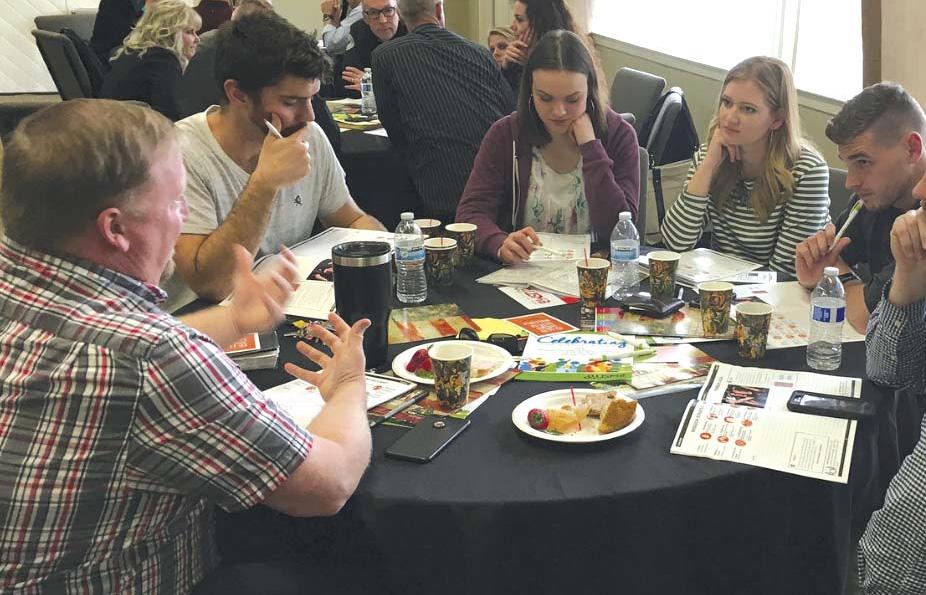





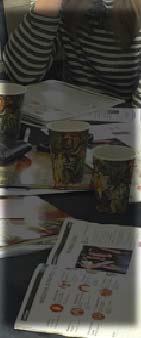






HRISTIAN EADER

















HRISTIAN EADER
God calls us to join him in making disciples in our churches, families and neighborhoods here in the United States and around the world. This call to serve does not depend on whether we live in the inner city, the suburbs or on a farm or ranch. It doesn’t depend on the size of our bank account, our profession, our age or our gender. It does not depend on our ethnicity, the level of education we’ve achieved or our political affiliation. In the church, God intends us to use our talents and interests in building his kingdom as Sunday school teachers, ushers or committee members, when we make coffee for the Sunday morning fellowship time, clear the snow from the church parking lot, sit in the tech booth at the back of the sanctuary or stand on stage leading worship. Fulfilling God’s command—and the church’s mission—requires that all of us be involved in the process of making disciples.
Let’s not lose sight of this big-picture understanding of the church and its mission when we U.S. Mennonite Brethren gather in January 2019 for a study conference on women in vocational ministry. Whether we hold an egalitarian or complementarian view—or something in between—let’s commit to an “all-hands-on-deck” approach to nurturing believers and making disciples. Let’s affirm the work of women serving our USMB congregations in a variety of roles and encourage others to actively join in local church ministries. In this issue, you can read essays by 12 of the 91 women who are listed as ministry staff members on USMB English-language church websites. The essays reflect on how God has led the authors into ministry. On our website (www.christianleadermag.com) we have posted the results of a short questionnaire that 24 of these 91 women completed.
Regardless of our views on the role of women in the home and the church, we can celebrate the ways in which God is building his kingdom thanks to the ministry of women. A blog post published this summer by Beth Moore, a best-selling Bible study writer and speaker who supports the complementarian view of her Southern Baptist denomination, reminds us of how vital it is to affirm women who are using their gifts in God’s kingdom. In her “A letter to my brothers,” Moore points out the sinful root at the bottom of many male attitudes toward women and calls for male ministry leaders to have “no tolerance for misogyny and dismissiveness toward women in your spheres of influence.”
God’s call to all of us to follow Jesus and to help others to be disciples is real. In January, we as U.S. Mennonite Brethren will continue to work out with fear and trembling how we understand that call with respect to women in our congregations. In the meantime, let’s remember and thank God for all the ways that God is already using Mennonite Brethren women to help us all to live out our kingdom calling.w
Vol. 82, No. 1 January / February 2019
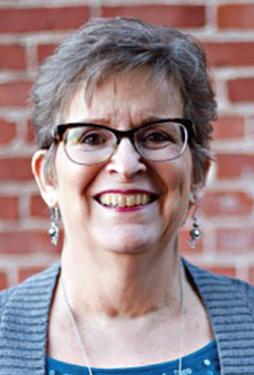
Connie Faber has served as editor of Christian Leader since 2004. She and her husband, David, are members of Ebenfeld MB Church, Hillsboro, Kan.
Connie Faber EDITOR
Janae Rempel ASSISTANT EDITOR
Shelley Plett GRAPHIC DESIGNER
The Christian Leader (ISSN 0009-5149) is a gathering place for the people, passions and mission of U.S Mennonite Brethren. The Christian Leader is published bimonthly by the U.S. Conference of Mennonite Brethren Churches. However, the opinions expressed here are not necessarily those of the church as a whole.
COPYRIGHT: The articles printed in the Christian Leader are owned by the CL or by the author and may not be reprinted without permission. Unless noted, Scripture quotations are from the New International Version.
READER PARTICIPATION: Letters to the editor should be 300 words or less and on one subject. Letters must be signed and include the writer’s city and state. Letters will be edited for clarity, appropriateness and length. Letters will be published, as space allows, unless marked, “Not for publication.”
Freelance article submissions are welcome; a SASE must accompany articles.
SUBSCRIPTIONS: $10 for six issues and $20 for 12 issues ($15, $30 in Canada; all other countries $25 for six issues); $1.50 per copy
CORRESPONDENCE: All correspondence, including subscription questions and address updates, should be addressed to Christian Leader Box 155, 107 N. Main Hillsboro, KS 67063-0155 Phone: 620.947.5543 Email: editor@usmb.org
MEMBERSHIP: The Christian Leader is a member of the Evangelical Press Association and Meetinghouse, an association of Mennonite and Brethren in Christ editors.
POSTMASTER: Send address changes to Christian Leader, Box 155, Hillsboro, KS 67063. Periodicals postage paid at Hillsboro, Kansas.
Christian Leader is published by

Students who attend YouthCon April 3-7, 2019, will have the unique opportunity to stand in the same place as did many of the USMB leaders they see in their churches when those leaders were high school students.
“We can’t wait to see what God has in store for us at YouthCon in April,” says Neil Bontrager, co-director of YouthCon 2019. “There’s something very special about knowing that these students will share an experience with the generations before them.”
Historically, the national youth convention, now YouthCon, has been a place of corporate worship, learning and relationship building. The location at Glorieta Camps in New Mexico facilitates that in a way no other location can quite fulfill. Everything from the dormitory-style living to the community tables in the cafeteria to the 3,000-seat sanctuary to the team-building activities keep students in a mindset of worship, learning and relationship.
The planning committee has a lot on the schedule for April and knows God will work in the life of every young person who attends. They hope that everyone who is interested is given the chance to participate in the once-in-alifetime conference.
“This YouthCon is going to be special,” Bontrager says. “This event will create space for students to connect with each other as well as opportunities to connect with the leaders in their home churches. We hope when they go home to talk with their congregations, these students find they have a new connection to previous generations who attended a youth event at Glorieta. We hope that shared experience creates a bridge and a desire for new relationships at home.”
Bontrager and the rest of the planning team hope churches recognize the confidence that comes from the encouragement and support of today’s youth.

The first National Youth Conference was held in 1975 at Glorieta Conference Center and returned to Glorieta in 1987, pictured above. Thirty-one years later, MB youth will return again to Glorieta for YouthCon 2019. Photo by Christian Leader
“Our youth are the future,” he says. “They’re the best investment we can make. Our students are the next generation of church-goers and decisionmakers for our communities.”
USMB Youth
When the USMB Leadership Board met Oct. 12-13, 2018, the board approved the 2019 budget. While the approved 2019 budget of $812,200 is 6 percent lower than the 2018 budget of $863,700, the new budget includes an increase in the USMB contribution to the International Community of Mennonite Brethren (ICOMB), a wage and benefit increase for USMB staff and an increase in financial support for USMB Youth.
Expenses in 2019 will be reduced over 2018 by, among other things, handling USMB social media inhouse and adjusting the amount budgeted for Mission and Ministry projects, which includes LEAD initiatives, internships and church planting, to better match the actual expenses for the current 2018 year.
The board also discussed recent events at Fresno Pacific Biblical
Seminary and reviewed a letter sent to pastors regarding the changes, reviewed the 2018 National Convention, continued discussions about diversity and heard reports from Don Morris, USMB national director, district ministers and national ministry representatives.
The board welcomed Kyle Goings as the representative of USMB Youth as well as newly elected board members Larry Smith, Lenoir, NC, and Theran Spahr, Wichita, Kan., Spahr is also the new Leadership Board treasurer. Previous treasurer David Hardt is now the Leadership Board chair, Boris Borisov, Spokane, Wash., is vice chair and Lianne Nikkel, Littleton, Colo., continues as secretary.—CL
Donations to USMB on Giving Tuesday, Nov. 27, 2018, totaled $15,851. Funds raised will be used to provide resources for three specific ministry opportunities: church planting and evangelism, leadership development and USMB Youth.
“I very much appreciate those who donated and remind everyone that 100 percent of those funds goes directly into resourcing and serving our local MB pastors and churches,” says USMB national director Don Morris.

The National Pastors’ Orientation will be held March 25-27, 2019, in San Diego, Calif. Held every two years, the event is sponsored by the USMB Board of Faith and Life. U.S. Mennonite Brethren pastors who are new to the pastorate or the USMB conference and pastoral staff members who have not yet attended are invited. Spouses are welcome.
“We can do so much more together. Thank you so much for giving.”
Giving Tuesday is a global day dedicated to generosity that falls on the first Tuesday after Thanksgiving. In the five years USMB has been part of Giving Tuesday, donors have contributed more than $148,000. —USMB
More than 150 people gathered Nov. 2-3, 2018, at Bible Fellowship Church in Rapid City, SD, for the 108th Central District Conference (CDC) convention.
Delegates unanimously welcomed Bethel Ethiopian Church of Sioux Falls, SD, as a new member of the CDC. The congregation of 125-plus moved into a new building this summer.
Delegates also affirmed a new church plant in Rapid City done in partnership with Multiply, the local, national and global church planting agency that works collaboratively with USMB and the five district conferences to plant churches across the U.S. Jon and Michelle Fiester and their family began the new church plant, Renewal MB Church, this summer.
The Friday evening banquet included a time of sharing by leaders from both Bethel Ethiopian Church and Renewal MB Church and a commissioning and
prayer time for these congregations. Delegates discussed and approved a CDC budget of $511,550, which represents a 15 percent increase over the 2018 budget. A new line item of $25,000 was added for additional CDC staff. John Langer, CDC chair, noted that additional staff will help alleviate additional national responsibilities, the addition of new churches and ongoing church visits that currently fall to CDC minister Rick Eshbaugh.
The 2019 budget also includes a $35,000 gift from the CDC to Gospel Fellowship Church in Wolf Point, Mont., toward completing their building project. Their church building was destroyed by fire four years ago. The budget also reflects CDC participation in two significant events: sending the CDC Faith and Life Committee to the national study conference on women in vocational church ministry to be held in January in Phoenix, Ariz., and sending potentially 10 couples to the 2019 USMB National Pastors’ Orientation to be held in March. The budget also includes funds to support two CDC church plants: Renewal MB Church and Redemption Church in Owatonna, Minn. Funds are also allocated to assist Agua Viva, Omaha, Neb., while pastor Daniel Rodriguez is a full-time graduate student. —CL
The event provides an opportunity to connect with leaders and pastors in USMB national and district families. The event will include worship, information and resources from MB agencies, time for questions and discussion, prayer, connection and fun. Speakers and leaders will include USMB national director Don Morris; the five district ministers; members of the U.S. Board of Faith and Life; and leaders representing Tabor College, Fresno Pacific University, Multiply (formerly MB Mission and C2C Network), MB Foundation and USMB Youth.
The goal of the event is to inform a new generation of pastors about who U.S. Mennonite Brethren are, how Mennonite Brethern work together and the USMB vision, as well as to help pastors network within the MB family. The event is built around the question, “Where do I and my church fit into the greater MB family?”
For more information, visit www.usmb.org/event/national-pastorsorientation/ or contact Lori Taylor at Lori@usmb.org. —USMB
Mennonite World Conference (MWC) invites Anabaptist-related churches around the world to observe World Fellowship Sunday (WFS) Jan. 20, 2019, as a day to observe a common theme in a worship service as an act of solidarity. The theme for 2019 is “Justice on the Journey: Migration and the Anabaptist Story.” Each year, different
churches that are part of the global MWC community prepare resources that can be used for WFS. This year, material has been prepared out of the experience of churches in Latin America and contains biblical texts, prayers, song suggestions, sermon ideas and stories. Resources may be found at www.mwc-cmm.org/wfs.
MWC
The Central District Youth Conference was held Nov. 8-11, 2018, at Inspiration Hills Camp near Inwood, Iowa. Around 100 youth and sponsors gathered for the conference, organized around the theme, “Abundant Life,” based on John 10:10.
Jason Maupin, founder and CEO of Elevate Industries in Milwaukee, Wis., was the speaker. Elevate Industries helps encourage, motivate and equip students to make healthy life choices. Attendees also heard from representatives of Tabor College, Faith Front, USMB Youth and Multiply, formerly MB Mission and C2C Network.
“We have been blessed to see God at work drawing the hearts of young teens to him at CDYC,” says Anthony Lind, associate youth pastor at Bethesda MB Church in Huron, S.D., and a member of the Central District youth committee.
Meanwhile, more than 380 youth and adults attended the Southern District Youth Conference held Nov. 16-18, 2018, at Fairview (Okla.) MB Church.
Speakers Randy Friesen, president of Multiply, and Fred Sutherland, Multiply short term mission program coordinator, addressed the theme, “Mighty Warriors.” The Jake Stemo Band led worship.
“The SDYC weekend was incredible,” says Russ Claassen, youth pastor at Koerner Heights Church in Newton, Kan., and district youth minister, in an email interview. “God did something beautiful in the lives of so many.… Students stood, bowed and huddled together to indicate their dedication to and reliance upon God. Several chose to believe and follow Jesus. Others determined to move from their passive belief to live all in as mighty warriors for the Lord and his kingdom.” —CL

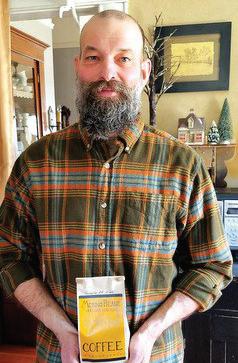

How did you get started roasting coffee?
My son really loves the smell of coffee, so when he had an opportunity to create a business for his high school entrepreneurship class he chose coffee roasting. He was hoping to do the business at school, but regulations prevented him from using a hot roaster in the classroom, so he and I purchased a small one-pound roaster and began roasting at home.
So, it grew beyond a little school project?
Yes, I would roast a pound at a time in our little roaster and give beans to friends and family to try. People just loved it, and pretty soon I was roasting every evening after work and it became clear that the little roaster wasn’t going to keep up with demand.
Where do you get your beans for roasting?
I wanted to be somewhat selective in where the beans came from. Suppliers needed to assure me that growers were being treated fairly, not just selling their product as a commodity to get the most profit
When Tim Unruh isn’t on the job landscaping around Tabor College’s campus or in his kitchen baking cinnamon rolls for a Marion County, Kan., clientele, he is with his coffee roaster, roasting another batch of Menno Beans coffee. Tim and his wife, Alissa, and their three boys spend their Saturdays selling bags of Menno Beans and assorted drinks at Rhubarb Market Coffeehouse and Roasters in downtown Hillsboro, Kan. Hillsboro MB Church is their church home.
for themselves. I narrowed it down to three vendors who are very conscientious about the production of the beans. Our beans come from 10 different countries. At any one time I probably roast from six or eight locations.
What makes your coffee different from a typical grocery store purchase?
I carefully roast my coffee in small batches to ensure the best product. Bringing the beans to a medium roast naturally brings out all the unique flavors in coffee from different locations. My local clientele enjoys the wide range of flavor that coffee offers from around the globe.
Why do you call it Menno Beans and put Menno Simons’ picture on the bag?
I wanted it to be a conversationstarter. I am proud of my Mennonite ancestry, and our coffee can be a tool for us to talk about our faith. Everything we have belongs to God and we want to share what God has given to us with others.
InterviewbyKathyHeinrichsWiest
Iwrite this with a heavy heart and not just a little alarm. The U.S. Mennonite Brethren Church is in danger of losing its unique voice developed in the Anabaptist Reformation and going back to Jesus and his teachings. In 1860 our branch sprouted out of a spiritual revival that emphasized the evangelical message of the gospel. That integrated aspect of faith and life set them apart. My concern is that the U.S. MB Church is losing its identity—that combination of evangelistic spiritual vitality and Anabaptist faith grounded in the Sermon on the Mount. We have always been about both.
The recent termination of Terry Brensinger as president of Fresno Pacific Biblical Seminary (“Seminary announces changes,” Sept/Oct 2018, p. 5) demonstrates this vividly. Terry was well received by churches and had rejuvenated the seminary through an online studies program with an emphasis in Anabaptist studies. When I spoke with President Jones at Fresno Pacific University, he told me that he had acted on feedback from district ministers unhappy with three online professors who had taken stands on issues debated among Christians but within our Confession of Faith. Disagreements like these on nonessentials of faith separate us. I’m so very sorry that President Jones made the decision to cave in to rigid thinking, leading to more polarization and increasingly generic evangelicalism.
As Mennonite Brethren, we have always been open to other evangelical influences and welcomed many pastoral leaders who have not been nurtured in our unique evangelical and Anabaptist integration. Christianity is far more than a passport to heaven. It’s about making a difference here and now. Jesus teaches that faithfulness is determined more by actions than by a list of beliefs (Matthew 25). This is the importance of the Anabaptist message. Former mission executive, seminary president and MB leader J.B. Toews warned against lukewarm generic Christianity with an emphasis on spiri-
tual vitality but “not inclined to build on the distinct theological identity essential for a growth of a church community with a New Testament Anabaptist orientation.”
I invite you to join me in a renewed commitment to our evangelical Anabaptist heritage, which is our distinctive gift to the church, the Church of Jesus Christ. Encourage your pastors and church leaders to study and teach this distinctive message of Jesus—the center of our faith, of our life in community and our mission of reconciliation. Encourage your district ministers to emphasize this Mennonite Brethren distinctive and support our institutions even if there is some disagreement. They are of vital influence in preparing church leaders for Anabaptist renewal that will lead to unity and growth.
David Wiebe Kearney, Neb.
Editor’s Note: The U.S. National Board of Faith and Life and USMB Leadership Board have sent a letter about the changes at Fresno Pacific Biblical Seminary to USMB pastors and leaders. The letter is posted on the Christian Leader website at https://christianleadermag.com/letter-from-u-s-board-o f-faith-and-life-addresses-changes-atseminary/.
TheU.S. Board of Faith and Life will host a study conference to discuss what God’s Word says about women in ministry (“Women in vocational ministry focus of January conference,” Nov/Dec 2018, p. 21).
God’s Word teaches us that in the eyes of God men and women have equal value and that he loves them equally. However, at the same time he has given the leadership in the church and in the home to men.
In 1 Timothy 2:12-13 we read, “And I do not permit a woman to teach or have authority over a man, but to be in silence. For Adam was formed first, then Eve.” That is where leadership of man
began—when God created Adam first. When Jesus chose his disciples, he chose 12 men. So, when the church began, the leaders were men. According to the Scriptures, elders are to be men. A pastor, including a youth pastor, should be a man. A song leader also should be a man. I believe that God does not call women to move into leadership positions. That would be contrary to his Word. The arguments that women can be leaders in the church just don’t hold water.
Many Christians in America have been greatly influenced by our culture into wrong thinking about leadership as well as about other issues. The Mennonite Brethren too often follow right along.
I believe that the study conference that is being planned to meet in January in Arizona is unnecessary. The Bible, God’s Word, is clear enough about leadership, and it is not that difficult to understand so there should not be disagreements. If we want to have a conference, it would be good to talk about how to encourage men to take the leadership in the church and in the home where it is so much needed. I would also like to see letters and articles in the Christian Leader that would encourage men to be leaders.
Harold Fast Hillsboro, Kan.
What motivated so many evangelicals (80 percent) to vote for Donald Trump in 2016? The common wisdom is that American evangelicals voted for Trump in order to get a Supreme Court justice that would overturn Roe vs. Wade. This explanation misses the point. Evangelicals’ support for Trump is actually a direct extension of one thing alone: their support of the Republican Party.
Shortly after the 2016 election, I was talking with an evangelical and Republican friend who decided not to vote at all in the presidential election since she could not lend her support to either
See LETTERS, Page 30
Oneday late last fall, as the bright leaves of autumn were twittering down in their joyous dives, I noticed my tears. I had been noticing their arrival quite often. I was reminded of decades earlier when a dear coworker softly gave encouragement and affirmation that I was the tears in the body of Christ. It was a validation during a time when I sought to dismiss my tears...my heart.
At that time, I was often frustrated with their unwelcome arrival during worship and when speaking. I must have been quite perplexed with my tears because I can recall another conversation with a visiting missionary. She had told me to be thankful for my tears, as she was no longer able to cry. I couldn’t imagine a life without tears.
These conversations kept me company as I married a seminary student and we launched into full-time ministry. Life was blissful and an adventure. And without much intention on my part, years passed by quickly.
So, it was a shock when I began to realize there is a restlessness growing within me. That the routines, activities and relationships that had always worked became void. When I was desperately searching and unable to obtain a contentment. When the hard things of life knocked me off my foundation. When I noticed that the tears were gone.
Looking back now, I know I was cocooned in a wilderness season. I had been invited into a sacred journey of divine transformation and would be called into a new way of being. Yet, at that time, I didn’t have the words for it. It took a while to uncover the grieving that needed to happen in my life and to settle into that space of wait.
And while all that inner turmoil was happening, I played my part—my roles. I smiled and gained weight on the outside yet felt sluggish and indifferent on the inside.
In 2009, I was introduced to some spiri-
tual practices at a Southern District Conference pastors’ retreat. They began to birth a dream to be trained as a spiritual director. In 2014, fruition came, and I started a two-year spiritual direction training program in 2015. At last! I had words and community to express my struggles. It was the birthing to come into a fullness of self as God’s beloved daughter. All of me. An invitation to not be filtered in fear or others’ expectations. Time for me to find myself. My voice. My joy. My confidence. My freedom. My uniqueness in Christ. Returning to those dancing autumn leaves. One morning, sitting out back in deep admiration of God the Creator, I heard the song I Arise by Keith Duke. The words and phrases expressed themselves deep within me as I did a lectio divina of sorts on their words.
I arise with the light of morning. Called to journey where I may. Hear us witness to the birthing, of this new and wondrous day. I arise and face the sunrise, with the wind upon my face. Know God’s breath, divine within me. Grounded on this sacred place. I arise with a cloak of healing. Tempered by my time of rest. Called to journey with the Spirit, On this sacred healing quest. On this sacred healing quest.
As this article comes to print, I will be mindful of the one-year anniversary with my bladder cancer diagnosis. Last January, I was ready to come alive in the fullness of myself. I was ready and willing, yet abruptly halted. There are stories to tell another time. For now, the words, “I arise with a cloak of healing. Tempered by my time of rest. Called to journey with the Spirit, on this sacred healing quest” are divine and inviting for me. They illicit tears, and I welcome their return. I can without hesitation thank the Trinity for my healing—physically, emotionally, spiritually.

Chandelle Claassen is a certified professional life coach, a member of the USMB LEAD Coaching team and has led several LEAD Cohorts. She is a trained spiritual director through The Schools of Sustainable Faith. She lives in North Newton, Kan., with her husband, Russ, who is the youth pastor at Koerner Heights Church and also the Southern District Conference youth minister. They have two boys and enjoy being an active family in their community.
Our priority: Moving from shoppers to servants

















By Daniel Rodriguez

We live in a world that focuses on consuming things. Our cities have stores all over the place, and from the construction we see, it looks like there are not enough yet. With just one click, we can buy almost anything we can think of on the Internet. It is very impressive—and very convenient. But I wonder how this consumer culture is impacting our lives as disciples of Jesus and the effects consumerism has on our mission.
The mission that Jesus gave us as stated in Mark 16:15 is to “Go into all the world and preach the gospel to all creation” (NASB). In Matthew 28:19, Jesus says we are to “go and make disciples in all the nations.”
“Disciple” is a word that I think in our time does not have the same meaning that it had in Jesus’ time and ministry. For Jesus, a disciple was a student and follower. In the Jewish tradition it was very important for a young Jew to be a disciple of a teacher. It was part of the culture. John the Baptist had disciples, the Pharisees had disciples and Jesus had disciples. Now Jesus wanted the apostles to do the same and to go to all the world and make disciples. In the book of Acts, we see the early church doing the same thing—making disciples of Jesus.
It looks like the early church was in a hurry to make disciples, and I think it was because they were thinking constantly of Jesus’ promise that he was going to come back. There is no time to waste, they thought. We need to make disciples, so we can greet Jesus when he is back.
The mission of these disciples was to preach the gospel of Jesus and to make disciples—students and followers of Jesus. The disciples were doing the same thing that Jesus did in his earthly ministry. The urgency of the coming of Jesus and the fulfillment of the promise of the Holy Spirit to show that Jesus was the Son of God were great motivation for the early church. They were making disciples that made more disciples because this was the instruction of their master.
What about us now? I think that we miss this urgency in the mission that Jesus gave us. I think we have forgotten that Jesus will come back, and sometimes we may even question if we want Jesus to return. We have everything available now, and we worry at the thought of losing all that we have.
I think this is part of the reason why our churches are not making disciples. We have other priorities. The urgency of preaching the gospel is not as important as other things. We worry about the ministries in our churches, making sure that everything runs smoothly. We worry about these things because the church has turned into a competition.
The church that best “serves”—makes people comfortable—is the church that will have the greater number of people. Serving means more programs, more technology to feed the people that will come to our services. We want big groups of people to come to our churches. This is a small part of doing ministry and church, but we turn it into the most important thing in our church.
Sometimes we relate numbers with success of the mission of church. Is the mission of the church to have a full building? I think the mission of the church is not to make our buildings full but to make disciples—students—of Jesus. In our culture, everything is easy access. “The easier the better,” and we want our churches to be the same thing.
Jesus call us to be servants. I think that we need to be acting on this idea. Making disciples has to do with making servants of the world. We represent Christ, and Christ was a servant. When we preach the gospel, we preach about the servant death of Christ. Christ died for us, and the attitude of the resurrected Christ was that after his resurrection he cooked a meal for his disciples.
We must teach people that following Christ is not just about coming to church and filling a space in the building but is about serving others in a culture that wants everything the easy way. I think that if we change our attitude—to be servants and to teach new believers and the people in our churches that to be a disciple means to serve others—the mission of the church will change, and we will be able to reach those who do not believe yet.
Moving from consumers to servants needs to be our priority. We need to teach people to serve more and consume less. I want to make sure that people in our churches learn the importance of serving. God gave spiritual gifts to every single one of us for the purpose of using our gifts in the body of Christ. We need to discover these gifts and encourage people to use them in the body of Christ.
One of the jobs of pastors and leaders is to equip people to serve and to make disciples. I conclude with four suggestions for how we can make disciples.
1. Be an imitator of Christ. Serve others with all your heart and do the hard work yourself. Have in mind that this world is not our home and that we are living for Christ.
2. Serve others with love so they can see the love of Jesus and with your words explain how much Jesus loves them. This is making disciples.
3. Help people to grow in their walk with Jesus. Create opportunities for people to serve others.
4. Do not be afraid to send people out to make more disciples.
We can be consumers and enjoy everything that is given to us inside and outside of the church. Or, we can be servants that make disciples for the glory of God. I think that God wants us to be servants that make disciples that make more disciples.
Daniel Rodriguez is the pastor of Iglesia Agua Viva, a USMB congregation in Omaha, Neb. This past year, Rodriguez presented a Spanish-language LEAD One event on discipleship in Omaha and Fresno, Calif., as well as a workshop on discipleship at the USMB National Convention held this summer in Salt Lake City, Utah. This article is adapted from those presentations.







From the time I was about 5 years old, my parents say they could tell I was going to be a missionary. I imagine it was evident early that I had a deep passion for caring for people and sharing with them the abundant life I had found living under the lordship of Jesus Christ. As I grew and matured, I continually found myself drawn to caring for others practically, relationally, emotionally and spiritually. In some ways, I have been a pastor most of my life.
Almost four years ago, I accepted a job at Willow Avenue Mennonite Church. My responsibilities have morphed over the years to fit my passions and the needs of our community. At present, I serve as a mentor and pastor to our small junior high and high school youth group; I oversee our outreach efforts locally and globally; I established and now run our Midweek Community Meal; I offer pastoral care to people in our neighborhood; and I serve in various supporting roles for the church as the associate pastor to our pastor, Audrey Hindes.
My deepest passion is loving others from the overflow of love I experience in Christ. I am especially drawn to those who are less privileged than I or those who are marginalized by our community. Every Thursday an average of 65 people from our church neighborhood and congregation gather in our church fellowship hall to share a meal. This began as an effort to start a new midweek worship service with a light meal offered at the beginning. But week after week, more people were showing up for food and

less and less were interested in staying for a service. We believe the core of our faith is found in Jesus and produces a life centered on community and a mission of reconciliation. So, it became clear that we are called to use the social power of a shared meal to break down the barriers that so easily divide us. As a result, we have people of many different ethnicities, socioeconomic statuses, faith traditions and cultural backgrounds serving and leading together as we share far more than just food, but also our lives and in so doing the gospel of Jesus Christ.
“Because we loved you so much, we were delighted to share with you not only the gospel of God but our lives as well,” 1 Thess. 2:8.
Whitney Allen
Associate Pastor of Youth and Outreach
Willow Avenue Mennonite Church (formerly College Community Church Mennonite Brethren) Clovis, Calif.
I am a teacher by nature and always have had a love and passion for people and music, so to combine these two together and work part time as the worship coordinator at Bethesda Church in Huron is an amazing combination for me. I enjoy my job immensely and don’t ever dread a day of work at the church or the school where I teach and lead music in many entities. I work

How God combines our passions and interests with meeting the world’s deep hunger.
InanticipationoftheUSMBstudyconferenceonwomeninvocationalministryhostedbytheU.S.BoardofFaithandLifeJan.14-16inPhoenix,Ariz., theCLaskedwomenwhocurrentlyserveonthestaffofUSMBchurchesto reflectontheirministry.Ofthe91womenwecontacted,12contributedanessay tothisprojectand25completedandinformationsurvey,theresultsofwhichare postedonlineatww.christianleadermag.com
Weaskedtheessayparticipantstoreflectonthisstatementandquestion:AuthorandtheologianFrederickBuechnerwrites,“TheplaceGodcallsyoutois theplacewhereyourdeepgladnessandtheworld’sdeephungermeet.”How haveyouseenGodcombineyourpassionsandinterests—thethingsthatbring youjoy—withyourchurch’seffortstomeettheneedsofyourchurchfamily, yourcommunityand/orourworld?

part time at Bethesda and part time at James Valley Christian School, and these two jobs are a near perfect fit for my family and gifting.
For the last eight years I have been leading worship from the piano with a team of volunteer musicians each week and loving every minute of it. It is a great opportunity for me to use my gifts of music and singing along with teaching my church family new songs and bringing them to a place of openness to hear the Word.
I have the privilege to plan all the services and choose the music, schedule the teams and special music and work closely with the senior and associate pastor to make sure everything goes as smoothly as possible each week and we are communicating the gospel of Christ and using music to do that.
God has allowed me this great privilege for some unknown reason to me, and I am grateful to utilize a gift in the place that it is needed. I am grateful to my church family for their love and support in my role and encouragement along the way. I will keep doing my part as long as God calls me to it and appreciate the privilege to do so.
Lorena Blom Worship Coordinator
Bethesda Church
Huron,
SD
e spend a lot of our lives trying to figure out who we are and why we are here; we want to know what difference we can make in the world. This journey is unique for each of us and is influenced by how we understand and experience the creator God, who we have walking alongside us and speaking into our lives, and how our church community invites and empowers us. The church communities that I have been a part of have affirmed and encouraged me in this journey. I have had opportunities through formal education, personal mentoring and life experiences to understand more of who I am and now have the joy of using these passions and giftings in my positions as associate pastor and Micah Project director.
One thing I am passionate about is mentoring and empowering the next generation to discover how they can be a part of building the kingdom, God’s kingdom of love. I believe God creates each of us with unique gifts and passions to share as we live out the holistic gospel. This gospel brings good news that is good to all. It feeds the hungry, clothes the naked, welcomes the stranger, advocates for the marginalized and works toward shalom. This gospel calls us out of the church pews into our neighborhoods and communities; it beckons us to get to know our neighbors, to listen, to share life, to walk alongside and then to work together to speak out against unjust systems and to create change that reflects the heart of Jesus. We are invited to bring light and love and hope to all by living fully into the unique per-

son we are created to be, thus pointing others to the creator.
With Jesus as the center of our faith, community as the center of our lives and reconciliation as the center of our work, North Fresno Church desires to be light, love and hope to the world and to invest in the next generation to share the holistic gospel wherever God calls them. It is out of this desire that the Micah Project was birthed. I have the tremendous honor and responsibility to direct this program that uses many of my passions and giftings. I was called from within the congregation to be the director and I continue to be affirmed, supported and empowered by this congregation, a gift for which I am extremely grateful.
The Micah Project is a 10-month discipleship experience that places participants (20- to 30-year-olds) in an intentional biblical community setting while exploring church and urban ministry and growing in leadership development. See themicahproject.wordpress.com for more info or email rdueck@northfresnochurch.org
Rhonda Dueck
Associate Pastor, Micah Project Director North Fresno Church, Fresno, Calif.
Iremember it well. The night I was curled up on the bathroom floor in a fetal position crying out to God: “If you can use this pain to help just one person, then it is worth it.”
Maybe that sounds dramatic, but it was truly the cry of my heart. The thought that God could bring some purpose out of the pain gave me strength to endure.
My daddy died when I was 5 years old. I was too young to understand at the time, and the pain got buried deep into my little heart. That night in my 30s I was finally feeling the gravity of the loss. God gently led me into the depths of my grief where the loss of my daddy was just one of many layers of unresolved grief from childhood and young adult traumas. The most difficult was facing the devastating reality of my abortions.
God is looking for people who are willing. That moment on the bathroom floor, what I was really crying out was, “God, I am willing to be used by you.” God heard and honored that simple prayer. First, he picked me up and held me as I mourned and grieved; then he brought healing, freedom and a new joy to my heart. My personal journey with God, biblical counseling and healing studies is what he has used to prepare me for what he has called me to do.
My role as Women’s Ministry director at The Bridge Bible Church is nothing short of a miracle of grace. After serving for seven years in post-abortion ministry, God called me to minister to all women—hurting women, lonely women and women who just long for more of him. He has called me to share the hope, freedom and joy that come from receiving his love, forgiveness and healing. This is my passion. This is the cry of my heart. He has heard my cry and has been answering ever since.
God clearly placed me at The Bridge. It’s a perfect fit of my passion and God’s purposes. We are a church where the truth of God reigns and authentic community is encouraged. We are given freedom to be transparent about our brokenness because it is in those broken places that God’s power and love shine through the brightest. I love that I get to be a bright light for him.
Debbie Haupt Women’s Ministry Director
The Bridge Bible Church,
Bakersfield, Calif.
The place God has called me to has been a process, a journey. I didn’t launch into adulthood intent on following a call from God on my life. That kind of language wasn’t even in my vocabulary—I wasn’t blessed with the idea that God might even call me to ministry. So, he had to take me on a journey. It started with investing my spiritual gifts in my local church. Through that, God opened a door for me to step into a staff position with my church. I don’t think I’d have accepted the role except that he shut the door on the career path I was on.
That was over 25 years ago. Since then, God has gently encouraged me to lean deeper and deeper into both my identity in him and my call in ministry. The journey God has had me on has been one of learning to spend time under his instruction, learning good and tough lessons in leadership and learning to say “yes” to opportunities he has put in front of me. And the more I’ve said “yes,” the more I’ve learned who I am in him and about his call on my life.
On this journey God has led me to places where my heart experiences a deep sense of sweetness in ministry. I’ve found that I have a passion for connecting—connecting the church to the nations, connecting people to a deeper life in prayer, connecting people to the work of the Holy Spirit and connecting people to the possibility of a call on their lives. I love seeing faith and perspective grow as someone goes on a mission trip. I love helping a young person discern a future in ministry or missions. I love seeing people invite the Holy Spirit to daily lead them. I love seeing the church join in the redemptive work of Christ. I get to be part of a birthing process—God birthing new things in his church, in my church and in his people for the sake of his kingdom.
I don’t think God is done shaping my call; I’m still on a journey. I’m still learning to say “yes” to the new and sometimes daunting ways he asks me to invest for him. The sweetness of my call is really about the sweetness of my Savior who gently, over 25 years, called me into ministry.
Jana Hildebrandt Connections Director First MB Church, Wichita, Kan.
My cup of gladness is most full when I am helping people become more aware of God’s presence in their lives. This might happen in the context of leading a traditional worship service, preaching a sermon or facilitating a small prayer group. But just as often, encountering God happens in the ordinary, everyday, mundane tasks and activities of life. Becoming aware of God’s presence in our lives is a lifelong exercise in learning to see.
From a very young age I have felt irresistibly drawn to God. As a child, I was encouraged to read my Bible and pray every day—and I did. Despite my intention to major in business administration in college, I experienced a deep desire to study Greek and enrolled in that course. Before I knew it, all I wanted to do was learn more about the Bible, which at the time I believed was the “road map” to encountering God. Some elders in my life were worried that I would “reason away” my faith. But academic study of the Bible only made my faith stronger.
Being allowed to ask hard questions gave me confidence that our God was big enough to handle it. The more I learned, the more excited I became, and I couldn’t help sharing with anyone who would listen and talk with me. I loved listening to and companioning others in their walks with God as they explored their own passions and embraced their suffering. I loved helping them to see where God was at work in their lives and in the world around us. I loved helping them discern how the Holy Spirit was prompting them to use their gifts and graces.
Today, I’m a year and a half into my role as the pastor at Willow Avenue Mennonite Church (formerly College Community Church Mennonite Brethren). My main areas of oversight are worship, congregational care and administration. One of the hallmarks of our church is “Sermon Talk,” an adult education program that happens each Sunday after the worship service. This is where the rubber meets the road as people have the opportunity to raise their own hard questions and ask the preacher to say more about something that piqued their interest in the sermon. We explore and discern together the implications of Scripture, music and prayers offered during the worship service.
Many members of our community have or are retired from careers in education, health and other services. They pour themselves into deeply meaningful work on a daily basis. Drawing on my education and experience, I create opportunities for our congregation to encounter God in ways that restore, refresh and renew so that they are inspired and equipped to continue their work and ministry. My job is to weave meaning out of the stuff of their lives, to help them see how God has been at work in and through them and to fortify them to continue to serve—and see—God in what they’re already doing.
kind of community within our church family.
In his book Leap Over a Wall, Eugene Peterson writes, “Friendship is a much under-estimated aspect of spirituality. It’s every bit as significant as prayer and fasting…. Friendship takes what’s common in human experience and turns it into something holy.” I guess that’s why, after all these years of seeking out, forming and fostering friendships between other women, it took a friend to sit across from me over lunch and tell me, with the kindest conviction in her voice, “You can do this, Jamie. I absolutely believe that God has called and equipped you to do this job.” In believing her, I believe I was listening to God’s Spirit. I accepted the position at NFC and have seen, day by day, the wonderful ways that God has indeed trained and equipped me to be a pastor in this place.
Within my roles I coordinate, recruit, give oversight to, mentor and equip volunteer leaders of small group ministries (Sunday school, midweek adult Bible studies, Life Groups, etc.) as well as worship ministries (vocalists, musicians, tech, etc.). I meet weekly with our lead pastor to coordinate our Sunday morning worship services, in which I plan and lead the congregation in worship along with our volunteer music team.
Jamie Mack
Director of Discipleship and Contemporary Worship North Fresno Church, Fresno, Calif.

Audrey
Hindes Pastor Willow Avenue Mennonite Church, Clovis, Calif.




eventeen years ago, when my oldest daughter was born, I resigned from my full-time teaching job to be a stay-athome mom. When my son was born two years later, the loneliness of my new role began to sink in and I longed not just for community but for camaraderie. And so, I began searching the local area for ways to connect with other women. Over the next decade, I found myself involved in various moms’ groups and women’s Bible studies all over town. Seeing the need for a deeper connection between women in our own church family, I eventually took an active role in gathering women for Bible studies, playgroups, book studies, parenting classes and more. I loved being a kind, welcoming presence for a “new” woman or an encouraging friend for a struggling mom. I loved seeing women connecting, comforting each other, laughing, learning and, most of all, belonging.
I admit there’s a selfish side to all of this. I’ve done much of this out of my own need to belong. But don’t we all have times we desperately need a true friend by our side? If I desire that for myself, how can I not want the same for my brothers and sisters in Christ in this place? As I’ve walked through the perils of parenting, the pain of miscarriage, the fear of foster-care licensing and the unknown steps of adoption, I needed to hear, “I’m here for you. I love you. WE can do this.” I want to help create this
hortly after attending North Fresno Church for the first time, I applied and was accepted to join their young adult 10-month discipleship and leadership training program called the Micah Project, which is led by Pastor Rhonda Dueck. My interest in the program stemmed from a deep shift of perspective that was asking, “What is biblical community?” My interests have always been in the organization and well-being of people. I explored these interests as I studied political science, participated in student government and public policy groups, lived in different communities, created or participated in art and sports and pursued health and wellness job positions.
What shifted for me was a passion for understanding what made living together as Christians so life-giving and different. My personal experience of being taken into a Christian home for healing because of a debilitating injury far from home fueled a drive to understand this irrational love for a stranger. How was I part of their community? What motivated them to welcome and accept me as I was? To care for my injury and well-being at their expense was not something that most communities do without some sort of transaction, expectation, initiation or application process. These questions directed me to following Jesus while being cared for and shown the gospel from a new perspective. Under Pastor Rhonda’s teaching and direction as part of the Micah Project, I was empowered to accept my current position at NFC. Before I knew it, God was already connecting my interests and passion with the church’s efforts to do the same things. Most of the job duties I could perform from my previous nonchurch experience, but it has simultaneously challenged me to make a deeper connection to my Christian faith. NFC’s vision for ministry includes the Anabaptist value “community is the center of our lives,” which by no means has been lost on me. Through this role I’ve grown from asking, “What is biblical
community?” to “Where, when, why and how?” I thank God for this opportunity as now I see it’s developed significant growth in my understanding of what biblical community is. Especially through receiving, implementing, practicing and sharing in it as NFC’s hospitality and kitchen coordinator.
Kelly Kucharski Hospitality and Kitchen Coordinator North Fresno Church, Fresno, Calif.
Iam the associate pastor of children’s ministries at North Fresno Church. I have been in this church for under a year but have served in a variety of other roles at other churches for 23 years.
My deepest passion is helping guide people closer to our loving God, compassionate Savior and active Holy Spirit. My guidance has taken different forms based on the present need of the church as well as the ministry and authority given to me in the place I serve.
I believe we are all on a journey of faith. Some of us may be aware only of a higher being who is present in this world, while others of us have experienced the salvific work of Jesus Christ. No matter where we are on our faith journey, however, we can each take a small step closer toward Jesus. I enjoy talking with people and discerning where each individual is on their path of faith and then challenging them, in their own unique way, to grow closer to Jesus.
Sometimes my nudging is subtle, bringing awareness of God’s presence and comfort to someone in grief. Other times, my guiding is more direct in counseling sessions or small group times. Through worship, prayer, nature, visual aesthetics and design, I help people connect with God in a kinesthetic, tangible way by creating spaces and experiences where our minds can settle, be gently guided and where we can focus on the quiet voice within.
My passion to guide people toward Jesus also expresses itself in teaching children and adults about him in ways that are engaging, entertaining and relevant to current culture and agegroup. I am a storyteller who enjoys bringing Scriptures to life. My systematic mind also enjoys laying out reading plans, curriculum and strategies to help people navigate Scripture and form routines of study and personal connection to God through prayer, Scripture reading and life application challenges. Recognizing God’s activity in our world and challenging us to be involved in making a positive difference in our neighborhoods and communities is an absolute must as we walk closer to Jesus. The incarnate witness of our living Savior is most apparent in our own lives where we live, work and play.
I am honored to serve God’s precious people and help guide them closer to the Giver of Life who meets all our deepest needs.
Connie Nicholson Associate Pastor of Children’s Ministry North Fresno Church, Fresno, Calif.

alatians 2:20 has been my life verse as long as I can remember. From a very early age, when I accepted Christ as Savior, I had a strong sense that my life would be about Jesus. I believe that was God’s first call (small c) on my life—to follow him. As I grew in my faith, there was a growing awareness within that God was Calling (capital C) me into much more. Throughout different seasons in life, I can recall several godly people who affirmed this in me.
For years I lacked clarity but continued to seek God for next steps. I remember wondering how he intended to use such a variety of seemingly strange and unrelated experiences to direct my path. When things got hard, I mean really hard, I felt disillusioned and disqualified. Little did I realize he was doing much more than leading me to a role or destination. God was (and still is) radically transforming and preparing me to be able to recognize and fulfill what he has for me.
A pivotal point in my life was when I began to recognize that God’s purpose for me was so much more about my identity in Christ rather than what I was doing. Embracing this reality has brought incredible freedom. Don’t get me wrong, this continues to be a process—but one filled with much more joy and less frustration. Now that I am older, and hopefully a bit wiser, I can connect the dots and am often stunned by God’s wisdom, patience and redemptive power.
I am in my sweet spot when I am serving and helping people. I have the privilege of being on staff and assisting those in our church family find ways to serve others and have impact for Christ. I am practically giddy about a new ministry partner that will enable our church family to help house and feed homeless families while providing them access to a variety of resources to achieve financial stability.
Linda
Oelze Director of Care, Community and Volunteer Ministries First MB Church, Wichita, Kan.
God has clearly called me to serve in an area that brings great joy to my heart and utilizes my gifts, talents and experiences. I serve as the mission’s director at Laurelglen Bible Church (LBC) in Bakersfield, Calif. I have worshipped at LBC for 29 years and have had the privilege to serve on staff now for nine years.
When I first attended LBC as a young woman, I had never been discipled nor attached myself to a church family. So those first four years were instrumental in my spiritual and emotional growth. I was baptized and became a member of the church in 1990. Through a series of events God turned my world upside down. He took the very hardest things in my life and redeemed them for his glory.
After adopting a Romanian orphan in 1993, I left my very successful 18-year career in banking to start a mission’s agency called Children to Love (CTL). Though originally an outreach to the abandoned children in Romania, CTL now works in Romania, India, Uganda and Ukraine with the most marginalized children and people of these countries. After eight years as the executive director, I had clear direction from the Lord that the season to be a stay-at-home mom was now upon me. So, begin-
ning in 2001 I spent all of my volunteer time at schools, soccer fields, theaters and at LBC in women’s ministry and missions with regular trips to Eastern Europe. In 2009 I came on staff during a time of transition at the church and in 2012 I took on the leadership of missions following a complete reorganization of the church. Once again God took the very hardest time in our church and redeemed it for his glory.
It has been an exciting adventure to reshape and strategize the future of our mission’s emphasis here at LBC, and I consider it a great joy to use my experience in missions, administration and leadership for reaching the ends of the earth. God even uses my banking skills on staff and in other countries. I travel several times a year to places like Uganda, Kenya, India, Thailand and Romania. I have family members in these places that look very different than I do, but I love them more than tongue can tell. I am blessed to influence my church leadership team as a director and love encouraging young people to live their lives radically sold out to take Jesus’ name to the nations. I plan all-church events and work with great volunteers of all ages and giftings. I like to consider myself a teambuilder and believe that the church is God’s plan to reach every tongue, tribe and nation. What an honor to be part of this plan at this time in this place!
Rille Pinault Missions Director
Laurelglen Bible Church, Bakersfield, Calif.
While getting my bachelor’s in biblical studies, I distinctly remember the semester I noticed a preaching class being offered. I thought to myself, “I will not be taking that class.” Considering my gender, inadequacies and fear of public speaking, I convinced myself God was not calling me to preach. Still, my insecurities could not drown out another voice that was whispering, “Maybe. Why not?”

After I started seminary, I heard that soft voice speak again when I saw a preaching class on the course schedule. I tried to remind the voice of the list of reasons why I wasn’t a preacher, but it would not listen. Instead, it blurted out to another student, “I want to try preaching sometime.” Before I could swallow my words, the student responded, “We need a pulpit fill in two months; I will let my pastor know.” Two months later, without any official training or guidance, I got behind the pulpit and preached my first sermon.
I’ve come a long way since then and have fallen in love with preaching. Sometimes, when I walk to the front of the worship space, I hear God assuring me, “You were made for this.” I am a born researcher. I love exploring ideas, observing people, reading and studying the Bible and theology. I am also incredibly sensitive. I live with my heart wide open, willing to embrace every joy and sorrow that comes my way.
When I preach, the best parts of me come together—I use my head to communicate my heart. The Spirit aligns my heart with God’s heart and uses me to speak God’s love into the broken parts of people. When I see eyes well with tears, shoulders relax, eyebrows wrinkle or heads nod or tilt to the side, I know congregants have found what they have been looking for: connection, belonging, hope, something worth believing and someone willing to embrace the mystery, messiness and uncertainty of life. Whenever my dad comes to hear me preach, a smile stretches across his face that you can feel, and I imagine God is doing the same thing. It brings me a great sense of fulfillment knowing that God is pleased with me. God’s love and affirmation continue to guide me back to the pulpit, giving me a fresh word, renewing my passion and energy and reminding me that God created me for this.
Grace Spencer Youth Pastor Neighborhood Church, Fresno, Calif.

Multiply to plant churches locally, nationally, globally
“Together that the world may know.” That’s the tagline for Multiply, the newly formed global church planting agency resulting from the merger of MB Mission, the North American mission agency serving in more than 30 countries, and C2C Network, the Canadian Conference of MB Churches church planting agency serving across more than 30 denominations. Multiply brings together C2C Network’s local and national church planter support systems and MB Mission’s contextual and holistic mission strategies. Together, Multiply will operate on mission locally, nationally and globally.
“Our vision for Multiply is that the church, the whole church, would find their assignment in mission, and that we wouldn’t just think of mission as somewhere far away—a location that you have to fly to or that is reserved for a few exclusive professional long-term missionaries—but that mission would be accessible to every part of the body of Christ,” says Multiply president Randy Friesen. “This merger means that we now consider North America as our eighth region of mission around the world, and we are looking at the challenge of reaching our communities and our cities with the same missiological focus as we would apply to any other part of the world.”
According to its strategic plan, Multiply exists to facilitate church planting locally, nationally and globally and will work on behalf of U.S. and Canadian Mennonite Brethren churches to inspire, equip and encourage multiplication of healthy disciples, reproducing churches and harvest partnerships.
The need for new churches in North America is great, says Mark Burch,

“It always works better when we’re together,” says U.S. church planting mobilizer Chris Douglas of his work with Multiply. “That’s a biblical concept that we’re in community and each fulfilling our role and our gifting within that community to strengthen the church and to prepare the bride and to see the kingdom of God expand as people’s lives are transformed and the gospel is proclaimed.”
Multiply North American director. The last major wave of church planting happened between 1945 and 1965 after veterans returned from World War II and people moved to the suburbs. A majority of North American churches are between 60-70 years old, he says, the number of years comprising a church’s average life cycle.
“We’re closing 4,000 churches a year in North America, so if we are not planting at least 4,000, we’re not keeping up with the closure rate of churches,” Burch says. “Then, if you analyze the health of churches—how many of them are evangelistically effective, how many baptisms are they having, how many people have come to faith, how many churches are they helping plant—it gets pretty discouraging pretty fast.”
Multiply’s goal is, with the church, to see an unprecedented harvest in which millions of people encounter Jesus, thousands of missional leaders are released and hundreds of harvest partnerships are formed.
“The health of our church really matters to me and matters to the Lord,”
by Janae Rempel
Friesen says. “I’m excited about what God has in store for us as we live on mission together here.”
History of Multiply in the U.S.
Discussion about ways C2C Network might begin working in the U.S. as well as Canada began three years ago at a strategy team meeting hosted by the USMB Leadership Board regarding a revisioning and restructuring of the U.S. Conference, known as the Future Story.
“Three years ago, we were challenged with the question, ‘What can we give as ministries for the health, the betterment, the more effective engagement of the USMB conference in the mission that God’s given her?’” Friesen says.
That led Friesen to prayerfully consider ways to utilize MB Mission’s North American staff and global relationships in collaboration with C2C’s church-planting strategies.
“I thought, ‘We can help leverage the relationships here that already exist in North America between a very effective church planting strategy that’s being used in one part of North America for
another part of North America,’” Friesen says. “That opened up the question, ‘What would it look like if we actually collaborated on a really significant level and maybe even brought ministries and organizations together to offer a single, integrated mission delivery system that was local, national and global?’”
The merger of MB Mission and C2C was approved in November 2017 at the Annual General Meeting of the Canadian Conference of MB Churches (CCMBC) and became official Jan. 1, 2018. At the time, Scott Thomas, who has since concluded his service with C2C, served as the U.S. C2C staff member.
As of January 2019, MB Mission and C2C have officially become Multiply, a global, Mennonite Brethren based church planting agency serving crossdenominationally as guided by three shared values: Gospel-centered, Spiritled and mission-focused.
Multiply will work collaboratively with USMB and the five districts to provide training, coaching, assessing and project management for church planters and to birth new MB churches across America.
“We are very interested in connecting the church in North America with the church in other parts of the world,” Friesen says. “Through this merger, we are now engaged with the structures of the Mennonite Brethren church here in North America in new ways that we weren’t before.”
Governance and new roles
With headquarters in Abbotsford, BC, and U.S. offices in Hillsboro, Kan., and Fresno, Calif., Multiply will be governed by the binational MB Mission—now Multiply—Board of Directors, representing both USMB and CCMBC.
Friesen, previously general director of MB Mission, will serve as Multiply president, while Gord Fleming, executive vice president of C2C, will be Multiply’s executive vice president.
A lead team will serve alongside Friesen and Fleming, including Esther Corbett in human resources, Doug
Penner in global program, Larry Neufeld in media and mobilization and Selwyn Uittenbosch in finance and administration.
The combined MB Mission and C2C roster includes more than 80 people. Multiply will have about 60 full-time employees in North America, with about 12 living in the U.S. Roles are still being defined.
Burch, who was previously the C2C Canadian director, will oversee the systems and structures of church planting, including assessment, coaching, training and support. He will also work with regional teams. Discernment continues, Burch says, on whether having one North American director is best or if directors are needed in both the U.S. and Canada.
Meanwhile, Chris Douglas, former U.S. church planting mobilizer with C2C, will operate under that same title
with Multiply and work closely with Stephen Humber, Mark Thompson and Galen Wiest, who will continue working as mobilizers.
“Their roles are going to stay very much the same, but they’ll be working with our local churches to mobilize both short-term mission trips and long-term overseas workers,” Burch says of Humber, Thompson and Wiest. “The additional piece is that, in their working with churches, they will also be keeping their eyes open for church planter potentials for North America, and Chris Douglas, instead of just looking for planters for North America, will also be keeping his eyes open for potential overseas workers. They’re all looking at local, national and global planters.”
The need for contextualization in the U.S. is evident, Burch says, as Canada is 20 years ahead on a secularization scale, with nearly 30 percent of people claim-
church planter’s base camp
Ascent Base Camp is a one-day immersion in the vision, values, tools and training that are required for the church planting venture. You will learn from seasoned church planters and get input from church planting strategists who will help you discern if this “climb” is one you should attempt. Join us
Hillsboro, KS January 12, 2019 Fresno, CA June 4, 2019
More locations coming soon.

ing no religious affiliation. That statistic drops to 15 to 20 percent in the U.S., where a Christian subculture remains.
To help understand the U.S. church planting context, an advisory leadership team exists, comprised largely of the former C2C National Team, and includes Don Morris, USMB national director; Brent Warkentin, pastor of First MB Church in Wichita, Kan.; Fred Leonard, pastor of Mountain View Community Church in Fresno, Calif.; and Paul Robie, lead pastor of South Mountain Community Church in Utah.
“I think the principles of church planting are the same, and I think many of the tools that we’re using, certainly training tools, are the same and will work the same,” Burch says. “Where the nuances are going to come are the cultural differences between Canada and the U.S. and understanding the context that we’re in.”
As the U.S. Mennonite Brethren church-planting agency, Multiply will offer resources for USMB churches, pastors, leaders and church planters and will work with churches in the five districts seeking to reproduce.
“We’re working on behalf of the conference to help these church plants and these churches that are looking to multiply,” Douglas says.
Typically, a potential church plant will be initiated at the district level, according to Morris, although Multiply may also initiate a project. Each district will provide subsidy directly to church plants in their district, as will Multiply.
Multiply’s support of a church plant extends beyond financial support to include personal, moral, administration systems and finances support, and the formation of a task force.
Multiply will help churches identify
church planters and will facilitate assessment, coaching, training and support of planters—the ACTS model as first implemented by C2C in Canada—as well as walking alongside established churches and pastors in the planting process.
Douglas will serve as a liaison with the USMB family. Eighty percent of his work will be on the local and national level, he says.
As a faith-based institution, Multiply is donor-supported and raises funds from individual donors and local churches to help financially support church planters.
Donors will have the ability to invest exclusively in the scope of the former MB Mission or C2C Network if desired by designating their gifts to either global church planting or North American church planting. Supporters who want to give to a specific project or person, can simply designate it on the check.
















“You can give to Multiply in general for church multiplication and expansion,” Douglas says. “Or you can give specifically to a church plant.”




Because Multiply works collaboratively and jointly with the national USMB conference and the five districts, it is critical that constituents continue to financially support all three partners, says USMB’s Morris. “Please don’t replace your giving to your district and USMB with giving to Multiply,” says Morris. “Donors are encouraged to continue giving to the district and national USMB and to give to Multiply over and above that.”
Vision: expand God’s kingdom
Multiply is united by a desire to live centered on the Gospel, led by the Spirit and focused on the mission.
“We have in the church the opportunity to unite people around the person of Jesus Christ, and the cross and the gospel and the fact that we are one in Jesus,” Douglas says. “One of the ways that we express that is through church planting and through working together to see churches planted and to see the kingdom of God expanded.”
It’s all centered on mission of reaching
people for Jesus, together.
“We’re praying for revival and spiritual awakening,” Friesen says. “We believe that linking the church globally is one of the ways that God wants to renew and revive his people and refocus them again on the mission that he’s given us.”—
Janae Rempel
Sunday morning services primary avenue
Churches, like individuals, celebrate birthday milestones, and Prodigal Church in Fresno, Calif., commemorated its first birthday Sept. 24, 2018, with Sunday morning services and an evening birthday party with a combined attendance of more than 700 people.
For Prodigal, reflecting on the past and looking ahead means continuing to be a place were everyone is welcome, seeking to be a blessing to the world and pointing people to Jesus.
“Prodigal has been a place where people (who) have been hurt and burned within other religious settings have come to be healed and refreshed and re-launched into ministry anew,” lead pastor John Richardson says. “That’s been great.”
Prodigal meets in the recently-renovated, 300-seat Bullard High School Theatre.
“It’s been a great fit for us,” Richardson says. “In fact, we’d probably choose this theatre over many of the church buildings that are in our own city.”
The church added a second service last September and weekly attendance has experienced continued growth. Fourteen people were baptized in Prodigal’s first year. Today, Prodigal averages about 340 people each Sunday.
Prodigal’s history
Richardson sensed a call to church planting while serving as campus pastor at Mountain View Community Church
Sunnyside in Fresno. Conversations between Richardson, MVCC lead pastor Fred Leonard and Pacific District Conference (PDC) minister Gary Wall led to Richardson and 150 others from Sunnyside starting a church. Prodigal officially launched in September 2017.
Richardson acknowledges the support received from the PDC and a Multiply task force whose members include Wall, Multiply’s Chris Douglas and Mark Thompson and two Southern California pastors, including Forrest Jenan, lead pastor of Neighborhood Church in Visalia. The goal, Richardson says, is for Prodigal to move toward independence in early 2019.
Inviting others in
Creating a welcoming space begins with Prodigal’s core values, including belonging before believing.
“You belong as is, whether you believe
or don’t believe, and we really think that that is transformative,” Richardson says. “We see that in the life of Jesus. In being accused of being a sinner and a friend of sinners because he spent time with them, we’ve seen those sinners become saints and make a great difference for the kingdom of God.”
To help meet the need for community, Prodigal offers eight-week small group sessions twice a year. Nearly 50 percent of the church was involved in 10 fall small groups with 10-20 people in each.
“It’s been encouraging to see new leaders step up to lead these groups as well as new and non-Christians attend them as they explore what following Jesus is all about,” Richardson says. Also unique about Prodigal, Richardson says, is its core value of diversity, not only of socioeconomic status or race but also of opinion, seeking to be quick to listen and slow to speak.

Prodigal has established practices to which Richardson attributes the church’s growth, including placing a high priority on Sunday morning worship services, excellence in social media and outreach.
Richardson views the Sunday morning service as the church’s primary avenue for influence. The church is intentional about guest experience, children’s ministry, music and use of media.
“They say that within the first 60 seconds of someone visiting a church, they’ve already decided whether they’re going to come back or not, so we’re intentional about our directional signage, our greeters (and) our bulletins,” Richardson says. “As soon as you walk in the foyer, we’re intentional about that space. We want to be creative, and we want to be excellent at every atmosphere.”
Prodigal recently hired additional staff to accommodate its growing children’s ministry.
“From start to finish, from their check-in to the way they’re greeted to the way we respond to individual needs of each family, (children’s pastor Brittney Howard) has done an amazing job,” Richardson says. “It’s a big reason why we’re thriving and having young families, new families, come every week.”
Also adding to Sunday worship is music and media. Prodigal’s band practices twice a week, and the church uses media creatively through videos, slides and more.
A second priority of Prodigal’s is use of church website and social media. The church provides its teachings on YouTube.
“I think that the excellence in which we do social media and videos and things like that is also a way to engaging culture,” Richardson says. “We’re a video, screen culture, period. So, we want to be where people are.”
A third priority in the life of the church is outreach events.
“(The) church is an organization, and
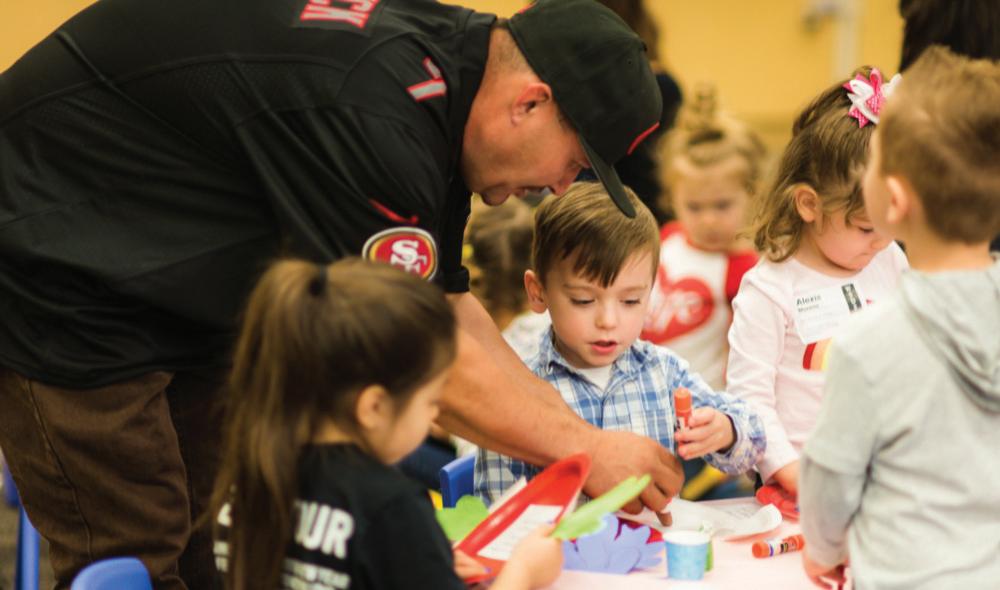
and their kids and their family and the people they’re praying for and their own situation,” he says.
maybe the only organization that lives and exists for the benefit of its nonmembers,” Richardson says. “It’s not a country club for the well, but a hospital for the sick. We’ve been intentional about doing things that give ourselves away in sacrificial love to people who aren’t a part of our church.”
Prodigal helped build an accredited Christian school, Thanthwe Christian Mission Primary School in Chiwaya Village in the southeastern African country of Malawi.
The school opened last September in an area where children had previously walked as many as 16 kilometers— nearly 10 miles—to school. More than 400 children attend. Prodigal sent an MB Mission team to Malawi in summer 2018.
Additional outreach includes buying Christmas gifts for children; supporting Breaking the Chains, a ministry that seeks to free women from sex trafficking; and partnering with a Fellowship of Christian Athletes club to host a Trunk or Treat event attended by 4,000 people.
“Prodigal Church doesn’t exist so that we get our spiritual jollies on a Sunday morning, but rather so that we can be a blessing to the world,” Richardson says. “We can be a fulfillment of the Abra-
hamic covenant that ‘I will bless you, and you will be a blessing.’”
Challenging aspects in planting a church include being “mobile” without a central building to host events during the week, Richardson says. Setup and teardown take time and energy. But there are also joys, including providing a life-giving place where people can reconnect with and fall in love with Jesus.
Looking ahead, Richardson would like to see continued connection with Fresno Pacific University and Fresno State University. He says he would like to see more women’s and men’s ministries, an awareness of God’s heart for the poor and suffering and a greater connection with Africa.
“I’ve been in full-time vocational ministry for 16 years,” Richardson says. “Every single one of those days God has used to instill in me and in others a vision for what we now call Prodigal Church. I’m so thankful to Jesus for his faithfulness throughout this journey and his faithfulness to Prodigal. I’m so looking forward to a greater future of helping people love God and others in a greater way—we truly believe the best is yet to come.” —Janae Rempel
USMB continues to look for creative ways to serve our local churches and to help maximize each Mennonite Brethren church’s full ministry potential. LEAD Cohorts is an initiative that has been well received and has provided significant resourcing for many.
LEAD Cohorts are online meeting places for small groups of MB pastors and leaders—or anyone interested in learning more about a specific topic while gathering with like-minded people. LEAD Cohorts are free to all participants and typically last three months, meeting online via Zoom video conferencing every two weeks for an hour.
Several cohorts are being offered this winter, beginning mid-January. They’re available not only to pastors and pastoral staff but to anyone who attends a MB church. For the first time, this winter cohorts will also be offered in Spanish and Amharic.
Lead Cohorts discussing the following topics will be offered: stewardship, ministry challenges, spiritual transformation, the Enneagram personality assessment, discipleship, pastoral counseling, youth ministry realities and church planting. Cohort leaders will include: Jon Wiebe and Dennis Fast, president and church relations director of MB Foundation, respectively; Pat Coyle, pastor at Shafter (Calif.) MB Church; Chandelle Claassen, trained spiritual director and life coach and member of the USMB LEAD Coaching team from North Newton, Kan.; Daniel Rodriguez, pastor at Iglesia Agua Viva, Omaha, Neb.; Jared Pulliam, lead pastor at Christ Church Sellwood, Portland, Ore.; Brian Allen, lead pastor at Hillsboro (Kan.) MB Church; Stephen Humber, Multiply regional mobilizer; Kimberlee Jost, Multiply board member; John Oelze, executive

pastor at First MB Church, Wichita, Kan.; Russ Claassen, Southern District Conference youth minister; Henock Tsegaye, pastor at Ethiopian Christian Fellowship, Olathe, Kan., and Chris Douglas, Multiply U.S. church planting mobilizer.
Kimberlee Jost, Ebenfeld MB Church, Hillsboro, Kan., says, “God has been awakening something in me for a while. While I continue to desire more of his presence in my own life, he has also grown in me a desire for others to fully know him. He has used the LEAD Cohort as time to teach, equip and encourage me. As a result, I have seen my faith increase. Two words to describe my experience: Disciple awakened!”
LEAD Cohorts are intended to make a significant difference in people’s lives. Although it’s fun to interact with others, perhaps a thousand miles away, cohorts also provide solid training and growth.
Dwight Carter, pastor of Zoar MB Church in Inman, Kan., writes, “My participation in two different cohorts has allowed me to get to know pastors from other parts of the country that I don’t get to interact with on a regular basis. I have valued the times when we have been able to share the joys, struggles and fears of ministry together and encourage and lift one another up. I appreciate USMB utilizing technology to bring us together and challenging us to engage our larger family.”
The various cohorts being offered can be found on the USMB website— www.usmb.org. Click on the Resources tab at the top of the page and then click “LEAD Initiatives for Pastors and Churches.” To sign up, simply send an email to Lori Taylor (lori@usmb.org), tell her which cohort you’d like to take part in and she’ll get you set up—it’s that easy. Zoom is also very simple to install on your computer or tablet and is free.
“Participating in the LEAD cohorts has been a huge blessing to me,” says Matthew Hamilton, pastor of Valleyview Bible Church, Cimarron, Kan. “I’ve been provided with the opportunity to network with other like-minded ministers and lay persons. I’ve been provided with an environment in which my desire for continued learning is met. More importantly, I’ve been provided (with) a comfortable atmosphere where I can genuinely share with others about the joys and struggles of ministry.”
Dave Buller, associate pastor of North Oak Community Church, Hays, Kan., has also benefitted from LEAD Cohorts. “Networking, spiritual development, leadership insights: I have experienced all three through USMB cohorts,” he writes. “I appreciate this added value to my personal development and ministry. Thank you, USMB and cohort leaders.” —USMB
Ayear ago, I asked our congregation to write down questions they have about our faith. No question was off limits. People asked a ton of great questions: “Will we know each other in heaven?” “If we should love our enemies, is it ok to fight back against someone if it is defense?” Some were thought-provoking: “Does God love the devil?” “Why do bad things happen to good people?” My personal favorite was, “Do animals go to heaven?”, written in crayon by one of our preschoolers.
This exercise sparked a good season of looking at the Bible and asking God our questions together. For some we found compelling answers. With others we wrestled with no conclusion and continue the journey in community.
Questions are an important part of my life. I’ve always been inquisitive. Even as a child I loved asking questions, much to the chagrin of many of my teachers. “Why is the sky blue?” “Where did the dinosaurs go?” “What does God look like?” One of the most frustrating moments of my childhood was when a fifth-grade teacher decided to stop answering my questions. From that point on I was done with that class, which is quite awkward when you’re barely two months into the school year.
Sometimes as we grow older we lose our inquisitiveness, and we are afraid to ask questions. It’s easier to sit with the answers we already know, the ones we’ve been taught our whole lives without looking deeper. If God is as amazing as we say God is, then God can
handle our asking questions. Even if that means asking the harder questions.
In this season, those of us at Cornerstone Community Church are talking with our neighbors, family and friends that don’t have a church community and are discussing questions they have about the Christian faith. We hope and pray this will lead to good conversations with people that we care about; it may surprise our friends to know that we have similar questions. God is still mysterious, and we don’t know everything. But we are willing and able to help our neighbors discover the answers.
We will hear our neighbors when they ask, “How can God let someone young die?” “Did God take a vacation when all of these bad things happened, or does God not exist?” They are hard questions, sometimes full of profanity. They’re often questions filled with hurt, but questions that if we’re honest we might have, too. They’re questions worth sitting with and exploring together.
I invite you to ask your friends, family members and neighbors that don’t go to church what questions they have about your faith. It might open doors to new conversations. It may enable you to make a connection with someone you’ve struggled to befriend. It might lead to someone learning more about Jesus. When we as Christ-followers are willing to hear our neighbor’s questions and not feel threatened by them, we are allowing the Holy Spirit to work through us.w
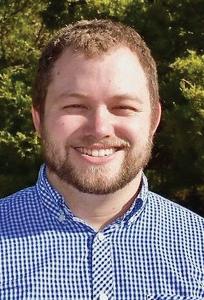
Ben Friesen is lead pastor of Cornerstone Community Church in Topeka, Kan. He is married to Caitlin Friesen, a former pastor at North Fresno Church, a USMB congregation in Fresno, Calif. Friesen enjoys reading, disc golfing and the occasional trip to the zoo. He is a graduate of Tabor College and Fresno Pacific Biblical Seminary.
Rapid City, SD, is a beautiful town located at the entrance to the famous Black Hills. Home to Mount Rushmore, the city brings in over 3 million tourists every year, and the locals welcome the summer crowd to share in our little piece of paradise. The magical draw here is part of the reason my family moved to the Black Hills in 2011. As we settled in, we became involved in local church life and were introduced to the Mennonite Brethren family.
On the surface, everything here appears to be postcard picture perfect. But God has shown us the deep spiritual needs which are easily overlooked. Rapid City is in transition. Historically, it has been a conservative, Christendom-style community. There are many traditional churches here that are ministering to that demographic. Recently, Rapid City has been quietly changing. The younger generations are moving toward a postmodern, humanistic identity. There is a growing group of people who are finished with, and moving on from, all things religious.
According to Homefacts, those who are “unclaimed” in terms of their religious affiliation went from 29 percent in 1980 to 37 percent in 2000 and to 59 percent in 2010. As our local culture becomes more and more postmodern, the church needs a fresh contextualization of the gospel. We feel called to reach those who are looking for a church home, even those who do not know it yet. This includes the people who think they have moved on from Christianity or have no religious affiliation at all.
This group still feels a pull and interest in the teachings of Jesus but are often turned away from many churches because they don’t identify politically with
the vast majority of traditional churches here. Our recently launched church plant, Renewal MB Church, seeks to engage these people through a genuine community which is focused only on one thing: the loving grace of Jesus Christ that draws people toward a relationship with him.
We regularly have conversations with people who see today’s church as something to avoid, because they believe it only seeks to expand a political kingdom. People like Suzy, who seeks to protect the environment and believes we should let hurting people enter the United States. Yet, she sees the churches surrounding her as not interested in having a real conversation with her about her beliefs, let alone welcome her into their community.
Another man who has started meeting with us, Trent, finds attending any church unappealing. He comes from a liberal background and is skeptical of things in the Bible. But he wants to feel free to ask questions in a safe space. One night after our gathering, he spent an hour just asking questions about the account in Acts of a lame man being healed in Jesus’ name. Trent wonders how he can know that what is written is genuine and not just a trick to coerce people and exploit them. Trent keeps returning and remains engaged in the conversation. Last week, he even stayed to help clean up after the service.
At Renewal MB Church, we strive to model what we see in Scripture: Jesus giving people like Suzy and Trent who need a savior an immediate sense of belonging and in that place of acceptance, having an opportunity to discuss beliefs and introduce them to Christ.w

Jon and Michelle Fiester are planting Renewal MB Church in Rapid City, SD. The core team for Renewal started meeting in January 2018. In July, they started building a launch team and are excited to see the growth God is bringing to the group. More info at www.renewalmb. church
Multiply works collaboratively and jointly with USMB and the five district conferences to birth new Mennonite Brethren churches in the United States and provides training, coaching, assessing and project management for church planters. You are a valuable part of the Multiply church planting team and are helping many people like Suzy and Trent encounter Jesus.
Evangelicalism and Anabaptism have historically described the theological identity of Tabor College. In the late 1980s and early 1990s, Clarence Hiebert and Wes Prieb articulated this descriptor of Tabor in chapels and in church pulpits. They were quite assertive in their identification of Tabor as an Anabaptist/evangelical school with both theological streams receiving equal importance.
The political climate of our nation combined with the media’s labeling of people groups and voter blocks has raised the question of whether we should continue to use these terms to describe our theological identity. As a college, we become victims of our culture when we allow these labels to distort who we are and the mission and vision that we have been called to live out. Therefore…
We embrace the term evangelical for the following reasons:
• the literal meaning of the term. “Evangelicals take the Bible seriously and believe in Jesus Christ as Savior and Lord,” says the National Association of Evangelicals on its website. “The term evangelical comes from the Greek word euangelion, meaning ‘the good news’ or ‘the gospel.’ Thus, the evangelical faith focuses on the ‘good news’ of salvation brought to sinners by Jesus Christ.”
• the inclusiveness that it represents. The label brings together many Christian traditions, forming a common community around theological convictions, doctrinal belief and faith practices.
• the global acceptance and understanding of the term. Evangelicalism is a worldwide movement that transcends American politics. No one geopolitical region or political party should define a theological identity of the college.
• the affirmation of our constituency. The term is supported by the vast majority of our constituents. It also is a term that the families of prospective students recognize when asking what does decidedly Christian mean.
• the transforming power that it represents. Only the transforming love of Jesus
Christ and the guidance of the Scriptures, which are the core of evangelicalism, can bring about the true transformation of a person. Incorporating true evangelical faith into the curriculum and practices of Tabor College enables us to fulfill our deepest desire for our students.
• the strong compatibility with our mission and vision statements. An evangelical faith is required to fulfill our mission statement and to provide the experience that we proclaim in our vision statement.
We embrace the term Anabaptist for the following reasons:
• the activism it promotes. It encourages people to become involved in helping make the world more as God intended it to be. Menno Simons writes, “True evangelical faith…cannot lie dormant… it clothes the naked; it feeds the hungry; it comforts the sorrowful, it shelters the destitute…it serves those that harm it… it binds up what is wounded; it has become all things to all creatures.”
• the lifestyle it calls us to. Living the way Anabaptism teaches is a healthy way of living. It makes for a meaningful and satisfying life that encourages reconciliation and peacemaking as a way of life.
• our historical roots. The college was founded because of a desire to have a school that teaches and trains men and women a certain brand of evangelicalism.
• the focus on discipleship. Following Christ requires us to engage in a lifestyle that demonstrates the power of Christ in our lives. Being a Christ follower is more than belief. It requires actions that demonstrate the beliefs.
• the positive impact it has on society. Our world would be a better place if, as a society, we would all embrace the principles of Anabaptism.
• the strong compatibility with our mission and vision statements. An Anabaptist understanding of faith encompasses our mission statement and provides the experience that we proclaim in our vision statement.
See VANTAGE POINT, Page 30

Jules Glanzer is president of Tabor College, completing his 11th year of service in this role. He and Peg have three children and nine grandchildren.
Lauren Nichols, Dwight Goossen, Diana Goossen, Ken Buller, Rosalee Buller and Tom Liu were received as members at Bethany Church, Fresno, Calif
Jake Froese and Lisa Froese were received as members Nov. 25 at Garden Valley Church, Garden City, Kan.
Leo Schafer and Aaron Christopher were baptized and received as members at Bible Fellowship Church, Minot, N.D., Nov. 18.
Bethany Ford, Jeronimo Hofer, Haley Jenkins, Violet Mack, Charlotte Wiens and Mai Xiong were baptized Nov. 18 at North Fresno (Calif.) Church.
Cambria Hale, Elias Mennis, Shannon Larsen, Cole Nebughr, Kristin Rigby and Michael Reynolds were baptized at South Mountain Community Church, Draper (Utah) Campus, Nov. 11.
Rebekah Lehrman was baptized at Kingsburg (Calif.) MB Church, Nov. 11.
Stan Van Sant, Janet Van Sant, Jeff Tyvoll, Sue Tyvoll, Ron Chapin, Shelly Chapin, Pat Epperly, Mari Glenn, Donna Robinson, Marly Braziel, Sylvia Young, Nellie Phillips, Cliff Friesen and Mary Friesen were received as members at Kingwood Bible Church, Salem, Ore
Austin Calam, Jessi Dalke, Anna Jones, Kaylee Lopez, Maddie Suderman, Alana Suderman, Caitlyn Thornhill and Hannah Thurston were baptized Nov. 4 at Ebenfeld MB Church, Hillsboro, Kan Krista Richert was received as a member.
Claud Chanley, Jennifer Chanley, Gabby Celaya, John Dupont, Rose Nunez, Andy Ratzlaff, Randi Ratzlaff and Ray Rodriguez were received as members at Grace Community Church, Sanger, Calif., Nov. 4.
Robert Cochran, Nichole Cochran, Emma O’Neill and Kylie Williams were baptized at Laurelglen Bible Church, Bakersfield, Calif., Oct. 28.
Harleigh Gibson and Jennifer Hagen were baptized Oct. 28 at Buhler (Kan.) MB Church
DeAnn Baldwin, Robert Baldwin and Carol Spalsbury were baptized at North Oak Community Church, Oct. 28.
Colby Armstrong, Jessica Chorniak, Gloria Xian and Ella Peinado were baptized at South Mountain Community Church, Lehi Campus Oct. 28. Six people were baptized at Lighthouse Church, Lakewood, Colo., Oct. 21.
Randy Van Bockel and Rebecca Van Bockel were baptized and received as members at Bethel MB Church, Yale, S.D., Oct. 14. Amanda Sneed and Nathan Sneed were received as members. Hannah Glanzer and Marlana Wollman were received as members June 3.
Justin Connerley, Melissa Connerley, Kristina Gonzalez and Manny Gonzalez were received as members Sept. 30 at Bethesda Church, Huron, S.D.
Rachelle Petersen concluded her service as associate pastor at Cornerstone Community Church, Topeka, Kan., at the end of December. Dave Stegall began serving as youth pastor at Pine Acres Church, Weatherford, Okla., Jan. 1. Julia Romero, former Micah Project intern, is serving as communications director at North Fresno (Calif.) Church
Adrian, Lovella Irene, Buhler, Kan., member of Buhler MB Church, Jan. 27, 1927—Oct. 5, 2018. Parents: Harry F. and Lena (Esau) Siemens. Spouse: Elmer V. Adrian, deceased. Children: Jean Olsen, Darrell; four grandchildren, five great-grandchildren.
Coppock, Ferrol F., Fairview, Okla., member of Fairview MB Church, May 15, 1926—Oct. 15, 2018. Parents: Charles Edwin and Roxy DeVore Fox. Spouse: Herbert Coppock, deceased. Children: Brent, deceased; Melody; Eric; five grandchildren, four great-grandchildren.
Eshbaugh-Holt, Tanya Wylene, Cawker City, Kan., Sept. 4, 1981—Nov. 25, 2018. Parents: Rick and Esther Eshbaugh. Spouse: Dan Holt, deceased.
Evans, Mary Jane, Fresno, Calif., of North Fresno Church, Oct. 21, 1922—Jan. 4, 2018. Children: Janet Nilmeier; Curtis Nachtigall, deceased. Stepchildren: Beverly Lyman, Sharron Evans. Ewert, Steven Ray, Fresno, Calif., member of North Fresno Church, July 4, 1957—May 26, 2018. Parents: Abe and Delora Ewert. Spouse: Lois Quiring. Children: Hannah, Joshua.
Post Oak MB Church, Indiahoma, Okla., celebrated its 118th anniversary with a special worship service and lunch Nov. 11, 2018. Guest speaker Peggy Goertzen reviewed the congregation’s history, and church leader Wass Ulloa moderated the service, including a prayer time. Following the service, a church dinner was served and Dave Gerbrandt, of Clinton, Okla., whose parents, D.J. and Linda Gerbrandt, were missionaries at Post Oak from 1945-1952, led a sharing time.
Goertzen told the story of Henry and Elizabeth Kohfeld from Kansas who were the first missionaries to the Comanche Indians living on the KiowaComanche reservation in Oklahoma. The Kohfelds moved to the area in 1896 and volunteers from the Corn (Okla.) MB Church built the first chapel. Two deaconesses from Kansas, Maria Regier and Katharina Penner, joined the Kohfelds, whose efforts were being met with indifference and suspicion. When the son of Comanche chief Quannah Parker became ill with tuberculosis and died, the chief found Kohfeld’s visits comforting and inspiring and no longer discouraged his people from coming to the Post Oak chapel.
In 1901, Abraham J. and Magdalena Becker joined the couple as missionary assistants. Their arrival coincided with the beginning of the allotment program on the reservation and Magdalena was hired by the government as an assistant field matron, which gave her a natural way to connect with the area residents. The first believers were baptized July 21, 1907. Goertzen highlighted the contributions of dedicated Indian workers, especially Herman Asenap who served as Becker’s translator for 24 years before he himself was converted. Becker also started an outreach ministry among Mexicans at Lawton, Okla., and in the late 1960s and early 1970s a number of Lawton families joined the Post Oak congregation. —CL
Feil, Julia Unruh, Bakersfield, Calif., member of Rosedale Bible Church, Bakersfield, Calif., charter member of Laurelglen Bible Church, Bakersfield, Nov. 22, 1929—Oct. 21, 2018. Parents: Jacob and Emma (Elrich) Unruh. Spouse: Eugene Feil. Children: Donald, Larry; three grandchildren, 11 great-grandchildren.
Flaming, Margie Marie, Weatherford, Okla., member of Corn (Okla.) MB Church, Nov. 3, 1931—Nov. 17, 2018. Parents: Peter Bernard and Lizzie (Hoock) Thiessen. Spouse: Gene Flaming, deceased. Children: Lowell, Bryan, Marsha Sauer; nine grandchildren, 14 great-grandchildren.
Friesen, Ruth S., Fresno, Calif., member of Reedley (Calif.) MB Church, Jan. 24, 1923—Nov. 7, 2018. Parents: Henry and Elizabeth (Beier) Berg. Spouse: Jacob Friesen, deceased. Children: John, Eileen Reimer, Gary, Ken; 11 grandchildren, one great-grandchild.
Gehle, William R., Shafter, Calif., member of Shafter MB Church, March 2, 1943—Oct. 31, 2018. Parents: William and Lucille (Backus) Gehle. Spouse: Grace (Froese) Gehle, deceased. Children: John, Mary Lara; four grandchildren.
Glanzer, Justina, Reedley, Calif., member of Reedley MB Church, Aug. 28, 1924—Oct. 24, 2018. Parents: Aaron and Mary (Krause) Warkentin. Spouse: Joe Glanzer, deceased. Children: Lyndon, Jodie Bishop; one grandchild.
Graham, Elizabeth “Sue” Dague, Fairview, Okla., member of Fairview MB Church, Dec. 9, 1931— July 27, 2018. Parents: Michael Leroy and Fern Almeda (Blair) Dague. Spouse: J.C. “Jake” Graham, deceased. Children: Stephen, deceased; Suzanne Thurman; five grandchildren, one greatgrandchild.
Hertzler, Marilyn, Reedley, Calif., member of Reedley MB Church, July 10, 1934—Oct. 21, 2018. Parents: Otto and Edith (Parker) Kliever. Spouse:
Charles Hertzler. Children: Kenneth, Paul, Karilyn Larson; eight grandchildren, one great-grandchild.
Janzen, Fran, Clovis, Calif., member of Reedley (Calif.) MB Church, Dec. 18, 1932—Oct. 16, 2018. Parents: Nick and Amanda (Flaming) Janzen. Spouse: Waneta (Jantz) Janzen. Children: Pam, Todd; three grandchildren.
Nachtigall, Donald, Fresno, Calif., member of Bethany Church, Fresno, June 28, 1945—Oct. 6, 2018. Parents: Irven and Doris Nachtigall. Spouse: Marilyn (Berg) Nachtigall. Children: Jenny Kroeker, Sarah Young, Josh; eight grandchildren.
Peters, Burton Ray, Fresno, Calif., member of North Fresno Church, Jan. 21, 1935—Oct. 15, 2018. Parents: John and Helen Peters. Spouse: Laurene. Children: Bryan, Lynda Muller; two grandchildren.
Schmidt, Wilma Ruth, Hillsboro, Kan., member of Hillsboro MB Church, March 9, 1929—Nov. 17, 2018. Parents: Frank and Margaret Woelk. Spouse: Andrew Schmidt, deceased. Children: Donovan, Lucretia Vance, Larry (deceased); nine grandchildren, 22 great-grandchildren.
Siebert, John (Johnny) G., Hillsboro, Kan., member of Hillsboro MB Church, June 27, 1929—Aug. 28, 2018. Parents: John J. and Lena Groening Siebert. Spouse: Ruby Ens. Children: Charles, Jean Hernandez, Bruce, Lynn Bartel; 16 grandchildren, 21 great-grandchildren.
Truitt, Robert “Bob” Maxwell, Fairview, Okla., member of Fairview MB Church, Dec. 4, 1938— Aug. 7, 2018. Parents: Samuel Jackson and Carleen (Lee) Truitt. Spouse: Velda (Penner) Wimer; Carol, deceased; Viola. Children: Susan Myers; Robert, deceased; Michael; Brenda Friesen. Step-children: Scott Wimer, Terry Wimer, Brad Wimer; 17 grandchildren, three great-grandchildren.
Garden Park MB Church, Denver, Colo., has dissolved after a 63year ministry and is in process of becoming a second campus of Lighthouse Church, a USMB church in Lakewood, Colo.
The congregation’s final service Oct. 28, 2018, included Scripture, music, prayer, revisiting the past and looking ahead to the future, communion and prayer for transitioning leadership facilitated by Southern District Conference minister Tim Sullivan, and a welcome to Lighthouse Church by pastor Josh Shaw. Garden Park was formally organized Aug. 25, 1955, with 28 charter members; two of the charter members attended the final service. Throughout the years, Garden Park was involved in a variety of community outreach events and urban ministries. The church’s gym
Unrau, Leola M., Hillsboro, Kan., member of Hillsboro MB Church, July 12, 1936—Nov. 3, 2018. Parents: Arthur A. and Elizabeth (Goering) Wedel. Spouse: Rufus Unrau, deceased. Children: Brian, DeVonne Abrahams, Kendall; four grandchildren, two great-grandchildren.
Vincent, Steve, Reedley, Calif., of Reedley MB Church, Jan. 10, 1951—Nov. 11, 2018. Parents: Lloyd and Eileen (DeLeau) Vincent.
Vogt, Marvin Roy, Corn, Okla., member of Corn MB Church, Oct. 9, 1929—Nov. 21, 2018. Parents: Henry and Anna (Suderman) Vogt. Spouse: Elsie Schmidt, deceased. Children: Roy, deceased; James; Charlene Jaronek; six grandchildren, six great-grandchildren.
Wichert, Vernon Ray, Fairview, Okla., member of Fairview MB Church, Nov. 1, 1938—Oct. 21, 2018. Parents: Herman and Marie (Morawski) Wichert.
Wineinger, Laurel A., Topeka, Kan., of Cornerstone Community Church, Topeka, April 6, 1940— Nov. 3, 2018. Parents: Albert and Anna L. (Wiscombe) Nichols. Spouse: Dean Wineinger; George Tipton, deceased. Children: Douglas Tipton, Julie Tipton-Weis. Step-children: Jim Wineinger, Ginger Ward; one grandchild, two step-grandchildren.
Wirsche, Salome “Dora,” Fresno, Calif., member of North Fresno Church, Sept. 17, 1923—June 15, 2018. Parents: Gerhard and Mathilda Schellenberg. Spouse: David, deceased. Children: Anthony, Joanne Jones; two grandchildren.
The Bridge Bible Church, Bakersfield, Calif., hosted a two-hour live Q Commons event Oct. 25, “The Power of We,” designed to educate Christians on cultural engagement and advancing
housed Community Ministry’s food bank, clothing bank and offices, and Lighthouse Church intends to retain ownership of the gym and negotiate leasing for Community Ministry. Garden Park’s ministry also included church plants, radio programming and partnerships with other churches.
“Garden Park Church leaves a legacy of people’s lives being changed and churches being planted out of the vision and generosity of Garden Park’s members,” Sullivan says. “That Garden Park will continue to live on through the ministry of Lighthouse Church is also a testament to the desire to bless what God continues to do in Denver through our MB churches.” —CL
good in communities. The event included three national talks and three local speakers.
Pine Acres Church, Weatherford, Okla., hosted a birthday party for Jesus for families with children third grade and younger. The Dec. 15 event included breakfast for dinner, games, cupcake decorating and the movie, The Star.
Women at Corn (Okla.) MB Church hosted a Christmas brunch Dec. 8 with games, caroling and musical entertainment. Attendees were encouraged to bring a toiletry item for Corn Heritage Village.
Grace Community Church, Sanger, Calif., held a combined English and Spanish service Nov. 18, followed by a Thanksgiving dinner. The church showed its appreciate to pastors Paul Canaday, Oscar Hernandez and Jeremy Bonnifield at its monthly potluck Oct. 28 with a special cake and gifts.
Zoar MB Church, Inman, Kan., held its Mission Impact Sunday Nov. 18 with a focus on local ministries and missionaries they support.
The Women’s Ministry at Rosedale Bible Church, Bakersfield, Calif., held an “Evening of Hospitality” Nov. 3 with a meal, door prizes and a devotional, “Journey to Hospitality.”
Bethel MB Church, Yale, S.D., held a Fall Harvest Party Oct. 31 with activities and candy for children. Children and adults were invited to wear Biblethemed costumes.
Grace Community Church, Sanger, Calif., held a worship night Oct. 27.
Rosedale Bible Church, Bakersfield, Calif., held a special worship service Oct. 14. The service, “Relentless,” focused on testimonies, poetry, Bible stories, music and art.
Neighborhood Church, Visalia, Calif., held Jingle Jam Christmas parties on Sundays in December with a variety of activities, including an ugly Christmas sweater contest, train rides, cookies and cocoa, food trucks, inflatables, photos with Santa, horse drawn carriage rides and a gingerbread house building contest. On Dec. 15, the church invited low-income families from the congregation and the Houston School neighborhood to come to a Christmas store to purchase presents for their children at reduced prices.
People from Valleyview Bible Church, Cimarron, Kan., were invited to an evening of caroling Dec. 9 followed by a soup supper.
Cross Timbers Church, Edmond, Okla., sponsored 18 families through Angel Tree, a program with Prison Fellowship, to bring hope to prisoners’ families during the Christmas season. The church hosted these families Dec. 16 for crafts, games and fellowship.
The Bridge Bible Church, Bakersfield, Calif., hosted The Flood Christmas Tree Lot on its campus. Purchasing a tree helped support the organization as it strives to reduce homelessness. People were encouraged to donate money to buy a tree for a family unable to purchase one or to volunteer. The church committed to providing 1,200 Thanksgiving meals for families in need. People from the church gathered Nov. 20 to prepare the turkeys and put meals together.
First MB Church, Wichita, Kan., partnered with Lighthouse Community Church, Wichita, to provide dinners to families in need in the Oaklawn neighborhood of south Wichita, Dec. 15-16.
People at Koerner Heights Church, Newton, Kan., were invited to volunteer to help at the Sunset Elementary PTO Christmas Store. People from the church also volunteered at a Sunset Elementary School PTO glow-in-the-dark family event at the school’s gym Oct. 19. People were invited to help with setup and decorating, staffing one of four activity booths during the event and helping with cleanup.
Rosedale Bible Church, Bakersfield, Calif., held a Bible character Trunk or Treat Oct. 31 with trunks and games decorated in biblical themes.
Willow Avenue Mennonite Church, Clovis, Calif., assembled 302 MCC school kits and donated $1,880 to cover the costs. Extra money went to MCC for students around the world. The church also hosted a Trunk or Treat outreach
Zoar MB Church, Inman, Kan., held a Trunk or Treat event Oct. 30, inviting people to fill their vehicle trunks with candy as a way to serve the community.
Dinuba (Calif.) MB Church hosted a family fun night Oct. 31 with games, prizes and free food.
North Fresno (Calif.) Church partnered with Robinson Elementary for a Neighborhood Carnival Oct. 31, creating a safe place for families and children to enjoy a fun afternoon.
Henderson (Neb.) MB Church held “Garage Parties” Oct. 31 as an opportunity for families to spend time together and get to know their neighbors. The church sponsored a “Love Henderson” event Oct. 17, serving its community by replacing boards on benches, cleaning downtown flower beds and picking up sticks and trash at the parks.
People at The Bridge Bible Church, Bakersfield, Calif., were invited to participate in a Christmas toy drive in partnership with Magdalene Hope, an organization striving to end human trafficking, and The River Church to deliver toys to children, many of whom are children of trafficking victims, drug addicts or those in poverty.
Kingsburg (Calif.) MB Church sponsored a cereal shelf for the Kingsburg Community Assistance Programs and Services. People were invited to bring a box of cereal the first Sunday of each month and the project concluded with a cereal breakfast Nov. 4. The church held a community service day Oct. 21 on Faith in Action Sunday, with jobs for various skill levels, a craft project and a group providing a worship service for residents at the Kingsburg Center, a senior living community.
Hillsboro (Kan.) MB Church held a “5th Quarter Outreach” in neighboring Lincolnville for junior high and high school students following the Oct. 12 football game. The intent was to share Christ’s love through intentional conversations and interactions, to stir spiritual interest and encourage area believers to grow and share their faith.
Junior high youth at Zoar MB Church, Inman, Kan., served with the McPherson County Feeds the Starving organization Oct. 10.
Cornerstone Community Church, Harvey, N.D., made 234 bags for MCC school kits and collected an offering of $1,055.
People at Laurelglen Bible Church, Bakersfield, Calif., gave more than $160,000 during Market of Hope 2018.
Bethesda Church, Huron, S.D., collected 49 boxes for Operation Christmas Child.
People from North Oak Community Church, Hays, Kan., packed 813 shoeboxes for Operation Christmas Child.
People from Greenhouse, Saratoga Springs, Utah, packed 100 shoeboxes for Operation Christmas Child.
Forty-four people from Zoar MB Church, Inman, Kan., served at the Operation Christmas Child processing center in Dallas, Nov. 23-25.
People from Bethel MB Church, Yale, S.D., sent 86 school kits to Mennonite Central Committee.
Around 100 people from First MB Church, Wichita, Kan., helped purchase supplies and assemble 773 school kits for MCC.
Women at Enid (Okla.) MB Church baked 21 pounds of peppernuts for the Oklahoma Mennonite Relief Sale Oct. 23.
Local Church Openings
Associate Pastor—Worship and Music: North Fresno MB Church is seeking a full-time pastor of worship and music for our contemporary service. The church is located in an urban area of the 500,000+ city of Fresno, Calif., and is very involved in the neighborhood. Responsibilities include pastoral leadership and oversight for our contemporary worship ministry. The qualified candidate would also provide leadership to another area depending on their gifting. The candidate should have a passion for Jesus, the church, the city, and demonstrated ability to lead worship in a contemporary setting. To apply please contact Shawna Stocks, search team chair, at sdthiessen@att.net. A full job announcement and job description is available at www.northfresnochurch.org.
Associate Pastor of Youth and Community Life: Garden Valley MB Church, Garden City, Kan., is seeking applicants for a full-time associate pastor with a passion for the spiritual development of youth and adults as disciples of Christ. To apply, please send resume to gvchurch@gmail.com.
From VANTAGE POINT, Page 26
Although evangelicalism as a movement came considerably later than the Anabaptist movement, in many ways, Anabaptism can be understood as a subset of evangelicalism. It is common to combine theological terms with evangelical such as Evangelical/Calvinist, Evangelical/Dispensational,
VP-Business Development: MB Foundation has provided a wide range of services to meet its partners’ capital needs and charitable objectives for over 120 years (www.mbfoundation.com). To continue to do so and to provide a sustainable revenue base, they seek an individual to serve as VP-Business Development with responsibility for developing and implementing a comprehensive marketing/business development program for the Foundation. The successful candidate will be entrepreneurial and have experience successfully building programs to expand and develop a client base. For more information please go to http://bit.ly/MB_VPBusinessDevelopment_OP .
Evangelical/Charismatic, Evangelical/Fundamentalist or any one of a number of theological terms that convey an understanding of evangelical. Given our history and scriptural understanding, evangelical/Anabaptist when combined define the heart and soul of Tabor College’s theological identity.
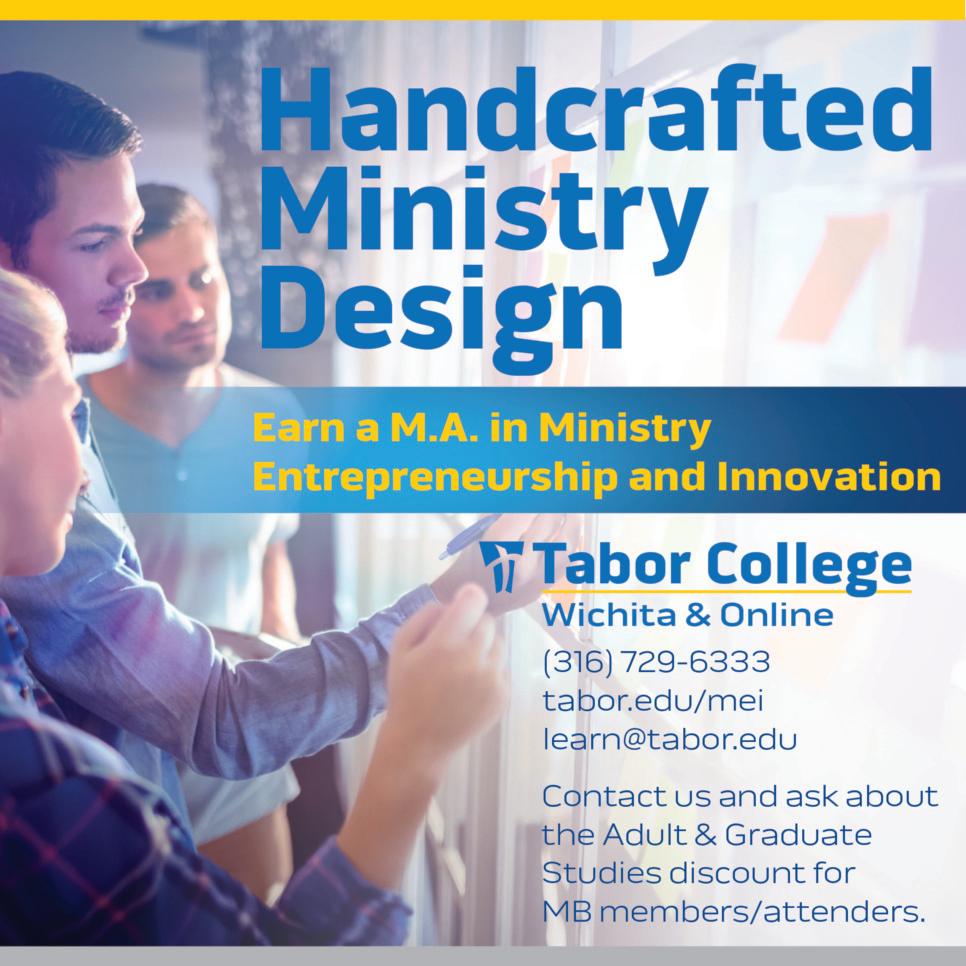
From LETTERS, Page 8
Trump or Hillary Clinton. She told me: “Well, it was a difficult election. I mean, evangelicals really had no choices in 2016.” That’s not true. There was another candidate who strongly shared my friend’s and other evangelicals’ positions on nearly every aspect of the conservative social and political spectrum: Utah’s Evan McMullan. So why didn’t evangelicals get out the vote for McMullan? And no, it wasn’t because McMullan is a Mormon. It’s because they knew McMullan couldn’t win. And there it is. The reason evangelicals voted for Trump arose from a singular devotion, not to a biblical mandate but to a party platform combined with a shot at their side winning.
How can evangelicals reclaim the credibility they once enjoyed with their fellow Americans? First, they need to stop trying to make people (and themselves) believe that their voting behavior is directly tied to their Christian values. That explanation was ushered from the chapel to the church basement by porn star hookups, vulgar rants and shady business deals. And second, evangelicals need to start working now to elect a president in 2020 who genuinely represents their Bible-based values. Thoughtlessly going into 2020 with no alternatives to Mr. Trump is NOT an option for those evangelicals who hope to restore and maintain any future credibility with millions of their fellow Americans.
What’s at stake for American evangelicals in 2020? Those who voted for the president in 2016 because of their Christian convictions were perceived as hypocritical. In 2020, evangelicals’ support for Mr. Trump will be perceived as pathetic.
Mike Klassen Cedar Falls, Iowa
As national director of USMB, one of my goals is to champion our enhanced USMB Youth program. Most of us realize, but sometimes neglect to support with our actions, that our youth are the future of our conference.
USMB Youth (https://usmbyouth.com) is led by volunteers who give their time and energy to help MB youth workers all across the U.S. be better leaders and provide resourcing that makes a difference among our teens as they seek to follow Jesus.
The networking goal of our USMB Youth program is “to connect, develop and resource youth workers—fulltime, part time and volunteer—(to be) a community of passionate youth workers who share one another’s burdens and inspire each other to keep going.” That is a worthwhile pursuit.
April 3-7, 2019, MB youth from across America will gather at Glorieta, NM, for several days of learning, growing, worshipping, networking and fellowship— planned and provided by USMB Youth. This big event that occurs every four years is a tremendous time for creating community and for sharpening the discipleship of our youth and youth workers. Please make sure the youth from your church get in on this great opportunity!
So much of today’s thinking in youth ministry is different than it was 10 to 20 years ago. As youth ministry has matured, eating goldfish, smearing whipped topping on one another’s faces and overusing fog machines are being reconsidered. What’s most important these days? That our youth are growing and maturing in becoming dedicated followers of Jesus. It’s no longer about how much pizza and soda teens can consume in one evening—and that’s encouraging to me.
Today, perhaps more than at any other time in history, young adults (and their parents) need spiritual help and direction.
The church plays a crucial part in this. It would be suicidal for USMB to abandon this new generation of believers.
In its current state, the church, as a whole, resists change. Youth pastors trying to make changes meet resistance from local church leaders far too often. As newer practices in youth ministry are driving efforts to cultivate spiritual maturity, USMB is striving to help our local MB church leaders see the benefit of youth ministries that make strong disciples. Let’s do all we can to support our youth and make it easier for our youth leaders to lead. Jesus modeled one of the best practices for the church. His discipleship didn’t depend on the latest book, the newest game or the best icebreaker. Instead, his model relied on the spiritual health of the leader and his/her willingness to spend time investing in a relationship of discipleship with Jesus. That’s what USMB Youth is helping to foster.
Kyle Goings, youth pastor at First MB Church in Wichita, Kan., and the chair of USMB Youth, said recently, “We (USMB Youth) want to build a deeper community and identity as Mennonite Brethren among youth workers in our national MB family.” That’s a very encouraging statement to me. That’s something I can support wholeheartedly.
For some time now, as youth pastors have come from other denominations to serve in our MB churches, it’s been difficult to incorporate them into our MB family. We now have a much improved USMB Youth program that I believe will make a huge difference in creating enhanced community and involvement among divergent MB youth workers. This will mean that these workers are resourced well and that they have a solid place to connect with others doing the same kind of kingdom work—for iron to sharpen iron. That’s a blessing. That’s something to celebrate. It’s all for greater impact: together.w
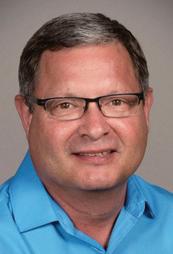
Don Morris began serving as the USMB national director Aug. 1, 2016. Prior to accepting this new position, Morris served as the USMB interim executive director for two years and as the director of Mission USA since 2004. He and his wife, Janna, live in Edmond, Okla., where they attend Cross Timbers Church.





























































































































































